
























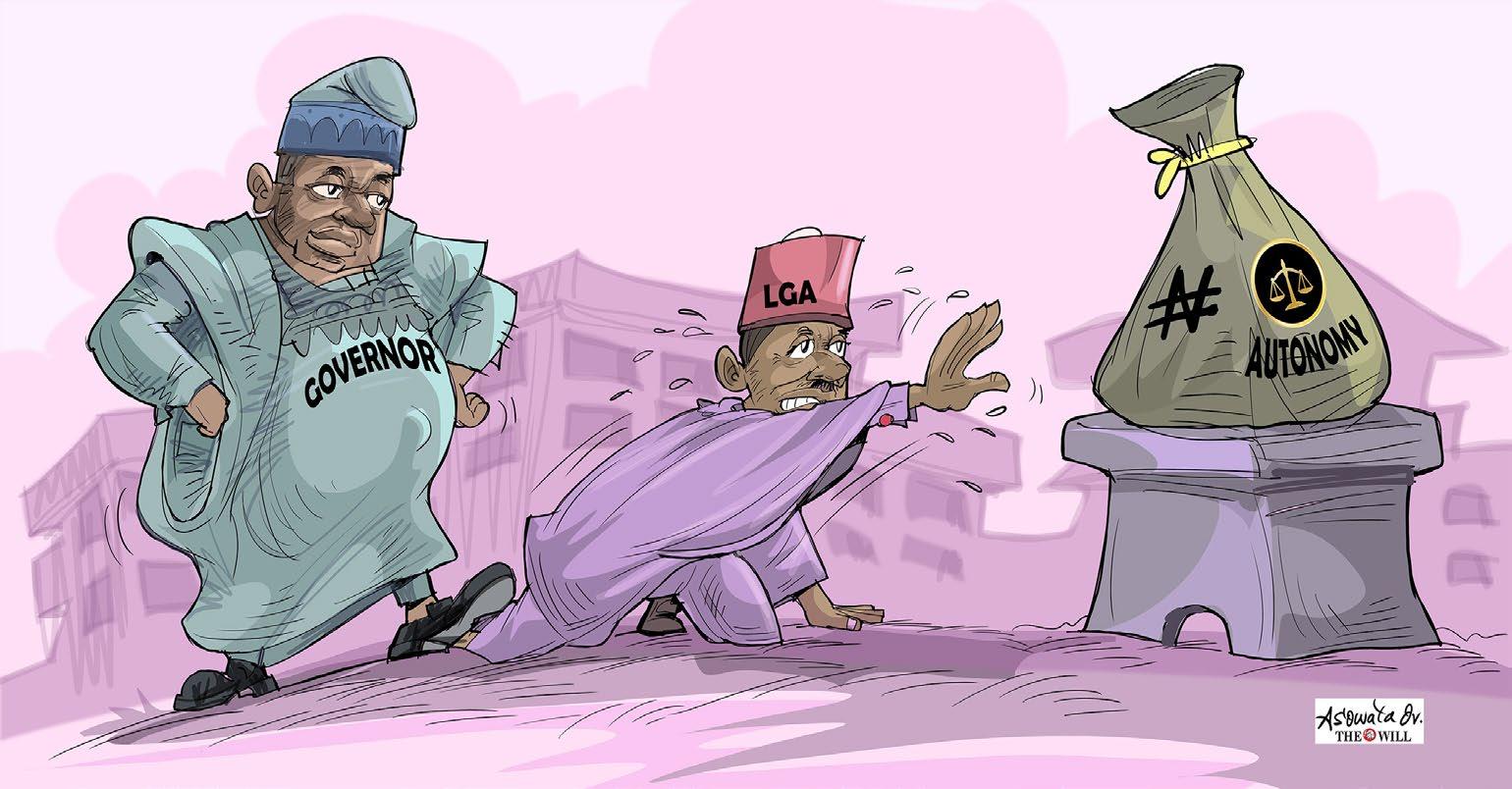







If there’s anyone who proves that consistency and sheer talent don’t go unnoticed, it’s Mike Afolarin. Afolarin captured the hearts of a generation in his break-out role as Ishaya Bello in the Netflix movie Far From Home You might ask how he got so lucky, but it’s not luck; he had been putting in the work before he got noticed, getting involved in short films and indie productions. Mike Afolarin is also a filmmaker, so he wears multiple hats: that of a performer and the other as a creator. He occupies himself behind the camera when not in front of it. He could be on another set just observing and learning when he’s not on set. He has also picked up photography as a new hobby.
Like most people, Afolarin had childhood dreams, one of which was to record music and perform in front of a crowd. He got to do that in his latest movie, A Lagos Love Story
We tell Mike Afolarin’s story on pages 8 to 10.
Downtown Confidential tells the tale of a relationship that has gone sour due to infidelity. Our main character must decide whether she will forgive the past.
Our fashion pages show you ways to wear a particular colour. This colour has a shade for every mood and occasion, ranging from pastel hues to richer shades. I’m referring to the royal hue, purple. Scroll to pages 4 and 5 to learn more.
I had expected Snow White to do well at the box office, but it didn’t. It did so poorly that Disney is reportedly in talks to stop making live-action remakes. I wonder where they got it wrong. There are too many bad reviews; I won’t bother watching this one.
Until next week, enjoy your read.







SUNDAY, APRIL 13, 2025


SUNDAY, APRIL 13, 2025


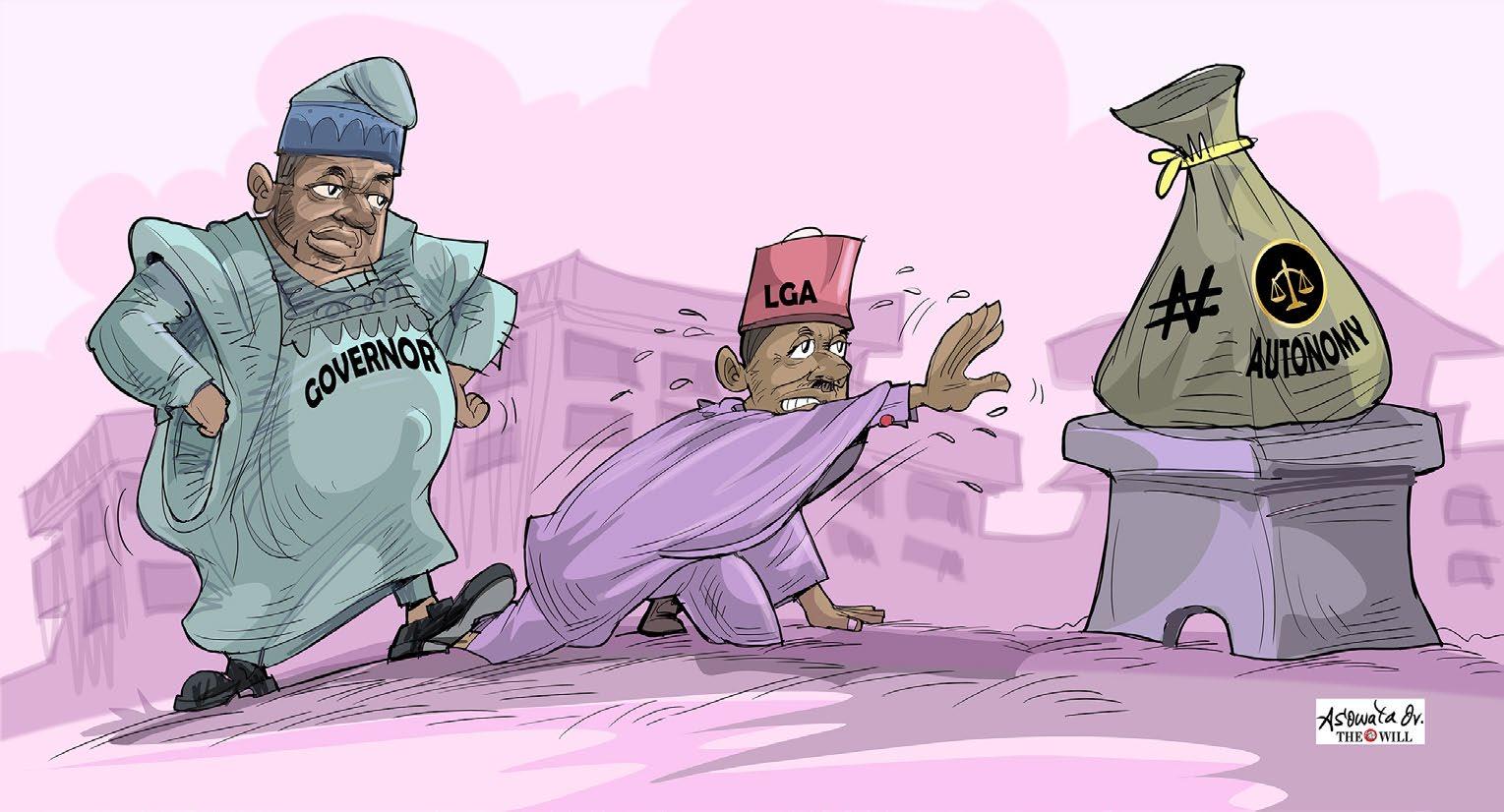
BY AMOS ESELE
Two months shy of a year since the Supreme Court of Nigeria delivered a historic judgment that upheld the financial autonomy of the 774 local government areas of the federation as the third tier of government, nothing concrete has happened.
The apex court also ordered the Accountant–General of the Federation to pay federal allocations directly to the LGA accounts. It declared that failure by the 36 states to remit funds to the LGAs was unconstitutional.
However, an indication of the states’ readiness to implement the apex court’s ruling became evident in January when the Central Bank of Nigeria reportedly directed the Chairmen of local government councils to open accounts with it for the purpose of disbursement of federal allocations. But the local government authorities are uncertain.
“Have you seen the letter released by CBN directing local government councils to come forward to open the account?” President-General of the Nigerian Union of Local Government Employees, NULGE, Comrade Aliu Haruna Kankara, asked THEWILL in answer to a related question during an interview on Friday. “The truth is that we have not seen any circular yet. As we speak, I only read about the CBN thing in the newspapers. As NULGE, we are appealing to the CBN to issue a circular to that effect. But that has not been done up to this moment as I am talking to you,” he said.
That quoted report happened in January, almost four months ago. Then, on February 10, 2025, the CBN publicly claimed it had begun the process of opening accounts for the LGA Chairpersons.
According to the Director of Legal Services at the CBN, Kofo Salam-Alada, who was a keynote speaker at a meeting on strengthening local government autonomy in Nigeria, organised by the Nigerian Bar Association, in Abuja, the bank was processing LGA Chairpersons bank details in collaboration with the office of the Attorney- General of the Federation and Minister of Justice and the local government councils which, he disclosed, the CBN had written letters to that effect.
“This is all about standard procedure in the form of KYC (Know Your Customer). Anyone who will be a signatory to the account must be profiled. The process is ongoing, and we are collaborating with the AGF’s office. We have also written to the LGAs,” he said.
Surprisingly, the Association of Local Governments of Nigeria, ALGON disputed the CBN’s claim as related by Salam- Alada.
Mr. Sam Akala, who represented ALGON at the event, stated that the association was not aware of any such letter as revealed by Salam-Aada of the CBN.
“I cannot confirm that such communication has not been received officially,” Sam Alaka said.
Relating this event, Kankara said, “This is happening because we do not respect the rule of law in Nigeria. If we respect court orders, we should not be in this situation. Since the Supreme Court delivered the judgement in July 2024, we are still fighting hard to ensure that it is implemented. They (the government) are foot-dragging.”
He added that neither the Ministry of Finance nor the
Accountant General of the Federation has done anything concrete since the court ruling. “That is our worry.”
THEWILL investigation shows that several state governors are opposed to financial autonomy for local government areas, and they have been working assiduously to ensure its non-workability. Although the Governors Forum alongside the Ministry of Finance, Accountant-General of the federation formed the Tripartite Committee working to implement the apex court ruling, most of the governors are said to be opposed to the Committees’ proposal that the LGA must open and maintain an account with the CBN.
The reason is because the LGA account with the CBN will disrupt the current State Joint Local Government, which empowers state governors to maintain control over the LGAs financially and politically. The Ministry of Finance and the Federal Government appeared to have outsmarted the governors with this proposal on the CBN account. But the majority of the governors are battling the idea to the ground.
When asked about this development, Alhaji Kankara admitted, “We have received the information, though we are yet to verify it that in some states the governors are stopping the LGA Chairmen from opening accounts with CBN.”
The second aspect of the slow implementation of autonomy for LGAs, according to investigation, is that the authorities are to identify an effective way to monitor expenditure at the local government level.
A senior staff of NULGE in Alimosho Local Government Area of Lagos State, who craved anonymity, recounted





how governors resisted a similar development under the Muhammadu Buhari Administration, which briefly disbursed “between N300 million and N500 million to local government councils in 2019,” under the Nigeria Financial Intelligence Unit Act, NFIU, and the accounting reporting system for LGAs. Eventually, the Buhari administration, despite support from the then Senate and failed attempts by governors to get a court judgement against the move, yielded to pressure from the governors.
The Buhari administration started the NFIU Act in 2018, which established the NFIU as the central body for financial intelligence in Nigeria. “The Act provided the NFIU with greater autonomy and independence to combat money laundering and terrorist financing. Additionally, the NFIU started implementing a new system for local government funds in 2019, mandating direct bank transfers for allocations and capping cash withdrawals.”
“Of course, we have challenges with the governors because they are the ones blocking local government autonomy all along and we believe they have a hand in the delay in nonimplementation of the apex court ruling. Every Nigerian knows that they want to spend the money on behalf of the local government councils. They do not want direct allocation to the local government councils. They want the money to go into the State Joint Account where they will be the one deciding who gets what,” Kankara told this newspaper.
Kankara accused the government at the centre and the states of playing politics with local government autonomy. Like the Buhari government that needed the support of the governors for its second term bid in 2019 and as soon as it had secured it, it became morally weak to implement the policy in 2019. The current administration appears to be less forceful on the implementation of autonomy for local government because of the prospects of successful politicking, which has begun and will expectedly peak in the last quarter of 2025 ahead of the electioneering years 2026 and 2027.
“We are appealing to the Federal Government to stop playing politics with local government autonomy. This thing has become a law. That is why all those concerned should do the needful.”
Now, the political terrain is becoming loaded against the government with the ongoing coalition talks among opposition parties, fear of defections of big wigs from the governing All Progressives Congress, APC, following growing criticism against unfair representation in appointments, worsening insecurity and untamed hardship in the country. This bleak picture has been compounded by the unstable global tariffs war unleashed by President Donald Trump of the United States, which imposed 14 per cent on Nigeria, in addition to the crashing of Brent Crude to a four-year low of below $70 per barrel at the international spot market as USAChina tariff war escalates.
Considering these political and economic developments, there are fears among LG workers and authorities that the governors may have their way because of political calculations ahead of the 2027 election.
A seven-member panel of the apex court, led by Justice Mohammed Lawal Garba, on July 11, 2024, declared unconstitutional the act of holding funds meant for local government administrations by state governors. It declared the act a clear violation of Section 162 of the 1999 Constitution, as amended.
According to Justice Emmanuel Agim, who read the lead judgement, 36 governors of the federation are barred from further retaining or utilising funds that are meant for the 774 Local Government Areas (LGAs) in the country.
Justice Agim held that no House of Assembly of any state has the power to make laws that could, in any manner, interfere with monies meant for the LGAs.
He declared, “Demands of justice require a progressive
interpretation of the law. It is the position of this court that the federation can pay LGA allocations to the LGAs directly or pay them through the states. In this case, since paying them through states has not worked, justice of this case demands that LGA allocations from the federation account should henceforth be paid directly to the LGAs.”
The court further declared unconstitutional the appointment of caretaker committees by governors to run the affairs of the LGAs. It held that the 36 states are under obligation to ensure democratic governance at the third tier of government.
going to work with relevant stakeholders to see to the end of the matter.
“First, I am trying to see how we can meet with the AGF, who is the chief law officer of the land, the Minister of Finance, the CBN and discuss how to enforce the Supreme Court ruling. We will try as much as we can to put pressure on the government too.”

It dismissed the preliminary objection by the state governors contesting the right of the Attorney-General of the Federation (AGF) and Minister of Justice, Lateef Fagbemi, to file the suit.
The court invoked sections 1, 4, 5, 7 and 14 of the Constitution to declare that the State Governors and State Houses of Assembly are under obligation to ensure a democratic system at the third tier of government in Nigeria and to also invoke the same sections to hold that the governors cannot lawfully dissolve democratically elected local government councils. They argued that “Nigeria, as a federation, was a creation of the 1999 Constitution, as amended, with the President, as Head of the Federal Executive Arm, swearing on oath to uphold and give effect to provisions of the Constitution.
Furthermore, they declared that the Constitution of Nigeria recognises federal, state and local government councils as three tiers of government and that the three recognised tiers of government are democratically elected and so can draw funds for their operation and functioning from the Federation Account created by the Constitution.
Restating that to put in place a non- existing democratically elected local government is to undermine the sanctity of the 1999 Constitution, they submitted that in the face of the violations of the 1999 Constitution, the Federal Government is not obligated under section 162 of the Constitution to pay any state funds standing to the credit of local government councils where no democratically elected local government is in place.
However, in separate preliminary objections filed before the apex court, the 36 states sought the dismissal of the suit with substantial costs.
They contended that the AGF, who initiated the action on behalf of the Federal Government, lacked the locus standi (legal right) to do so and further alleged that the AGF breached their right to a fair hearing when he failed to serve them with a copy of a further affidavit he filed in support of the suit
Kankara who is barely a month’s old in office said he was
“ We are appealing to the Federal Government to stop playing politics with local government autonomy. This thing has become a law. That is why all those concerned should do the needful
He said that though some of the local government chairpersons are reluctant to come forward for understandable reasons of having been supported into office by their governors, “we are getting cooperation we can from them, even though we know how limited they are because many of them are in office with the support of their governors.”
Reacting to Kankara’s claim that the government is playing politics with LGA autonomy, a media aide to President Bola Tinubu, Tope Ajayi disagrees.
He said the matter is entirely the work of a Tripartite Committee and they are working on it independently.
“They are working out the implementation. Government is working on it. There is a tripartite committee composed of the Nigeria Governors Forum, Association of Local Government Chairmen and the Federal Government. They are working out the details of the implementation of the Supreme Court judgement, that is all I can say,” he told THEWILL in a brief interview on Friday.
For the Attorney-General of the Federation and Minister of Justice, Lateef Fagbemi, a Senior Advocate of Nigeria, the LG autonomy implementation committee has been working on a structure that would enable the government to carry out the apex court ruling on the direct payment of allocations from the Federation Account to LGAs.
“The committee is expected to complete its mandate any time from now and present its recommendations to Nigerians,” the AGF stated, adding that the President Bola Tinubu Administration remained committed to granting LGAs full autonomy, he said at a recent event in Abuja, adding, “Local government structures had almost become extinct in Nigeria, necessitating the intervention of the Bola Tinubu administration. As a staunch advocate of democracy and the rule of law, the President took decisive action by filing a suit at the Supreme Court in May 2024. On behalf of the federation, I brought the Attorneys-General of the 36 states before the Supreme Court to secure declarations ensuring the full emancipation of local government areas in Nigeria.”
According to him the act is tantamount to treason and must be treated as such. “While it is true that section 308 of the Constitution grants governors’ immunity from prosecution, I wish to be clear that this flagrant disobedience to the Supreme Court judgment will have unpleasant consequences for the state as a whole, should it persist,” he warned.
On Thursday last week, he advised Nigerians to eschew political partisanship and stick to the law in their interpretation of court judgements. “You’ll see that I’ve avoided taking sides on any issue, though I’m part of the government.
“The CBN is currently awaiting directives from the Federal Government to open local government accounts for the respective states, which can be done between 24 and 48 hours for each.’
“I am a member of the sub-committee that was set up to trash out contentious grey areas and we have already met relevant stakeholders, including labour unions, local government chairmen, NULGE and so on.
“There was a general agreement that the commencement of direct federal revenue allocations to LGAs will be this January.
“Hopefully, we are just rounding off meetings and making submissions to the Federal Government for implementation and there’s no set timeline.’’

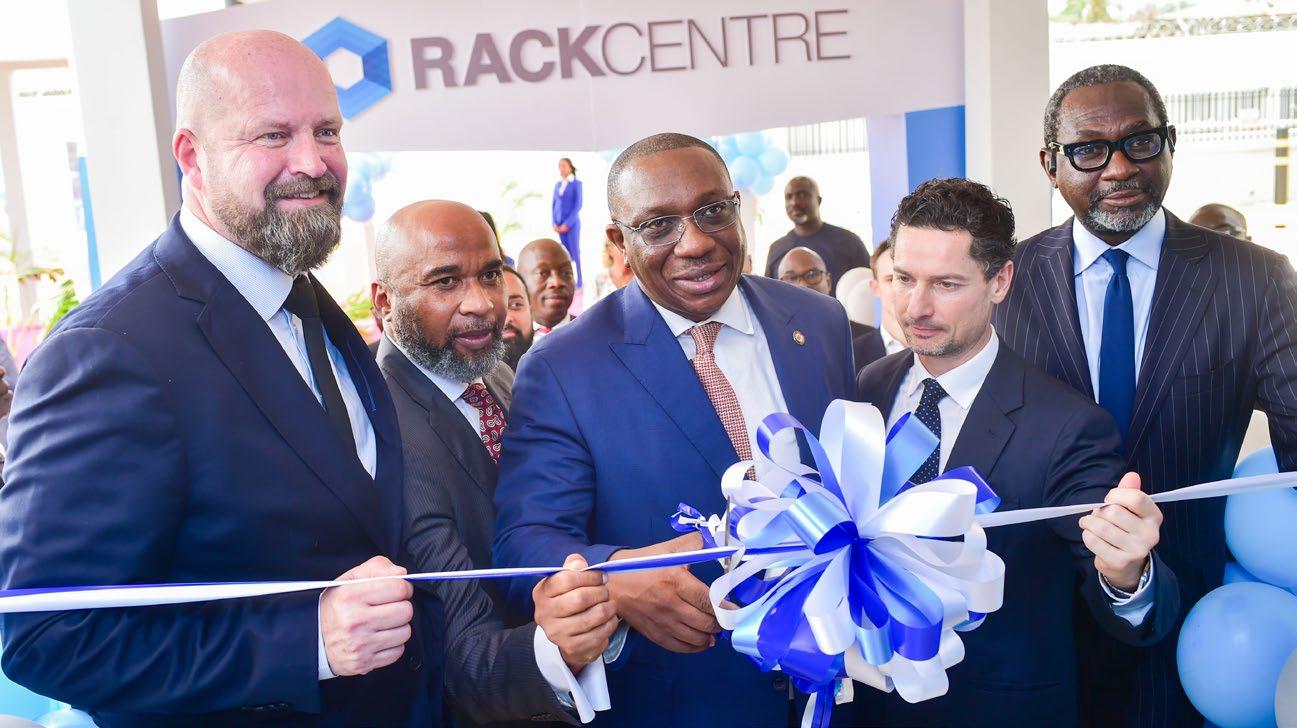
BY FELIX IFIJEH
The Federal Government has inaugurated a sub-committee to assess the economic implications of the recent tariff measures announced by the United States government and the evolving global price landscape.
This was disclosed in a statement on Friday by Mohammed Manga, Director of Information and Public Relations at the Ministry of Finance. According to the statement, the decision emerged from a meeting of the Economic Management Team (EMT) presided over by the Minister of Finance and Coordinating Minister of the Economy, Mr. Wale Edun.
Former U.S. President Donald Trump, who recently re-emerged on the political scene, had imposed a 14 per cent tariff on Nigerian exports to the United States, arguing that while the U.S. pays 27 per cent on its exports to Nigeria, the current arrangement was unfair to American trade interests. However, the Trump campaign later revised the tariff to a uniform 10 per cent for all countries— excluding China—citing efforts to create a balanced global trade environment.
Reacting to the development, Nigeria’s Minister of Industry, Trade and Investment, Dr. Jumoke Oduwole, had warned earlier
in the week that the U.S. tariff hike could significantly distort trade relations and erode the competitiveness of Nigerian goods, especially in sectors heavily reliant on access to the American market. While Nigeria’s crude oil exports are not directly affected by the U.S. tariff adjustments, the Federal Government has expressed concern about the broader macroeconomic risks tied to global commodity price fluctuations. Manga stated, “The EMT convened to review the fiscal and economic ramifications of ongoing developments in the global trade environment, including the U.S. tariffs and declining oil prices.
“To ensure evidence-based policymaking, a sub-committee has been established to conduct a comprehensive analysis of both the direct and indirect economic consequences of the emerging global trade measures and commodity market volatility.”
According to the Ministry of Finance, the sub-committee comprises representatives from the Ministry of Finance, Ministry of Budget and Economic Planning (including the Budget Office of the Federation), and the Central Bank of Nigeria (CBN). The committee is expected to present its findings in the coming weeks to guide the Federal Government’s response to these unfolding economic challenges.
BY ANTHONY AWUNOR
In a significant move to combat human trafficking, the Chairman of Air Peace Group, Dr Allen Onyema, has expressed deep concern and condemnation over the recent discovery of Nigerian underaged girls trafficked to Ivory Coast, as highlighted by activist VeryDarkMan.
In a statement issued on Saturday, Dr Allen Onyema called for collective efforts to discourage trafficking, emphasising its inhumane and ungodly nature.
examination and treatment. “While we implore the Nigerian Embassy in Cote D’Ivoire to assemble them and reach out to us, we equally call on the Federal Government to take charge of their education while reuniting them with their families”, Onyema advised.
BY KAJO MARTINS, MAKURDI
Benue Investment and Property Company Limited (BIPC) has expressed its readiness to take advantage of idle funds at the Central Bank of Nigeria for housing development in the state.
This is just as it is planning to set up a Benue Primary Mortgage Bank that would provide accessible and sustainable housing finance and empower residents of the state to own homes.
Playing host to the Management Team of PMI Consultant on how to set up a primary mortgage bank at its headquarters in Makurdi, the Group Managing Director of BIPC, Dr Raymond Asemakaha, appreciated the firm and pledged readiness to key into productive initiatives that would transform the state in line with the vision of Benue state governor, Rev Fr Hyacinth Alia administration.
He acknowledged the need for the mortgage, emphasising that it would enable the state to take advantage of idle funds to its advantage in due course.
Earlier, Mr Sanusi Auta said the primary mortgage is a pioneer initiative that would put Benue on the path of development, explaining that the scheme will have offerings such as social loans (NHF), rent-to-own, home purchase loans at commercial rates, construction financing and home renovation loans, mortgage refinancing, and title perfection, among others.
According to him, while the CBN’s minimum capital base requirements are significant, the company is expected to generate substantial annual income.
In a remark, the leader of PMI Consultants, Rabi Andrew, said the mortgage bank will be the first of its kind in Nigeria as no other state has a state-owned primary mortgage in the country.
Dr Onyema said, “We should discourage trafficking of any kind. It is inhumane and callous. It is absolutely ungodly and a good example of man’s inhumanity to man. We, at Air Peace, are ready to bring our fellow citizens back home free of charge.
“Besides that, we are going to send all of them to Duchess International Hospital in Ikeja for free medical
The Director General of the National Agency for the Prohibition of Trafficking in Persons (NAPTIP), Hajia Binta Bello, had also reaffirmed the Agency’s readiness to act and outlined its engagement with key stakeholders.
The DG revealed recently that NAPTIP was already working closely with the Ministry of Foreign Affairs, the Ministry of Justice, the Department of State Services (DSS), the National Intelligence Agency (NIA), and the Office of the National Security Adviser to facilitate a coordinated rescue operation.

She noted that if implemented, the state will stand a chance to benefit from the pool of idle funds at the Central Bank and other funds from the World Bank, United Nations, USAID, etc.
In separate reactions, Company Secretary, Barr. Josephat Ioryoosu, General Manager, Real Estate and Infrastructure, Lucy Jato, Department Head, Business Development and Strategy, Theresa Abeda, and Department Head, Legal Services, Almed Anuga, all welcomed the initiative.




L-R: Entrepreneurship Manager, ANAMMCO Motors, Abuja, Mr. Uchechukwu Ejechi; Administration Officer, Ms Chinaecherem Okoronkwo; Director, Corporate Services, Mr. Uche Okeke and Assistant General Manager, Sales, Mrs Chinelo Igwe, during a news conference on plans to unveil its new product ‘ MATADOR ‘ at the ongoing 36th Enugu International Trade Fair in Enugu on April 10, 2025.

BY ABDULLAHI YUSUF
The Deputy Governor of Kano State, Comrade Aminu Abdulsalam Gwarzo, says Northerners are very safe in Edo State, pursuing their legitimate means of livelihood.
Gwarzo is the Chairman of the Kano State Government’s high-powered investigation committee sent to Edo State to unravel the circumstances that led to the recent killing of 16 hunters at Uromi. He made the declaration on Friday while interacting with Journalists shortly after the committee returned to Kano from Edo State.
“From the mammoth crowd of Northerners and people of Edo State that received us at Uromi and Benin, and the expressions we saw on their faces, it is clear that Northerners there are very much comfortable, very much at home, feeling very safe”, he said.
The Chairman said the committee’s visit to Edo State was a follow-up to the visit of Governor Monday Okpehbolo to Kano, Bunkure and Toronkawa, where he met and condoled with the State Government and families of the slain hunters over the killings.
heinous incident.
“So, we are convinced that the entirety of the leadership in Edo State and Uromi kingdom are totally against what happened. They rejected it in its totality, and they condemned it in strong terms.
“And they have taken steps to calm the nerves of the people of Edo, the extraction living there, and to assure and reassure the nation that Uromi and Edo State will continue to welcome people from all parts of the country, especially people from the north and Kano state in particular”, he said.
The Deputy Governor said the government and people of Kano State want justice in the whole matter, including payment of compensation to the
BY FELIX IFIJEH

“It took us almost two hours to reach Uromi from Benin. There was a huge crowd waiting for us, both indigenous and our people living in Uromi and earning their living in Uromi. So, what we have seen is really encouraging”, he said.
He said Governor Okpehbolo personally led the high-powered committee to Uromi where they commiserated with the traditional and religious leaders over the killing.
“There is a leadership there, political leadership has rejected and condemned this obnoxious act, this very tragic incident. The traditional leadership was so outspoken and vocal and condemned in strong terms the perpetrators of this very dastardly act. The religious leadership also condemned the

families of the victims.
“All we need is justice, and justice must be seen to be done. They have told us that they have arrested a number of people, about 14 people. And the other encouraging aspect of it is that the governor, as the Chief Executive of the state, has taken very solid and bold steps to ensure that nothing like that happens again.
“And to assure and reassure everybody, all nonindigenes, particularly people from Arewa and Kano in particular, that Edo is safe for them to live in.
“The governor has disbanded the vigilance group and the key figures that perpetrated the dastardly act have been arrested, and more are going to be arrested because some of them are on the run. The police and the DSS are still looking for them.
“He has assured us that there is going to be compensation for those who lost their lives, and those who lost their belongings, because you know they were coming back from Port Harcourt. They had their items of various categories in the vehicle, and the whole of it was burnt”, he added.
The Lagos State Government has sealed off 13 markets in Ketu and Mile 12 for persistently flouting the state’s waste management laws. A statement by the Commissioner for Environment and Water Resources, Tokunbo Wahab, said the measures were crucial to safeguard public health.
“In line with our commitment to environmental sanity, Ketu and Mile 12 markets were successfully sealed last night for persistent violations, including illegal waste disposal on roads, medians, and highways – contrary to the Lagos State Environmental Management and Protection Law of 2017”, he said. The list of sealed locations included Erukan Market in Mile 12, Oja Oba Market in Ketu, Owoseni Tundas Market and Oba Ogunjobi Market in Mile 12.
Other markets and shops affected by the clampdown include the Shops Owners at the BRT Terminal in Mile 12, the Mile 12 Bus Stop Shops, and Ketu Terminal

Market, which has six plazas. The closure further extended to the Ifesowapo Shop Owners Market in Mile 12, Demurin St Plaza Shops in Ketu, and a range of other businesses, including The Occupant at 6 Demurin Road, Ketu. Ifelodun Market in Ketu, Ibadan Unit 1 Park located between Babajide Sanwo-Olu Market and Ikosi Fruit Market, and the Ketu Tipper Garage were also sealed as part of the operation.
“This action is not just about enforcement; it is about ensuring that market stakeholders take full responsibility for proper waste management going forward. We cannot allow our markets to become breeding grounds for filth and health hazards. Let us all work together to build a cleaner, safer, and more responsible Lagos”, Wahab said. The Commissioner said the markets would remain closed until waste disposal practices are aligned with the state’s regulations.
First Lady Oluremi Tinubu, (m), Minister of Health and Social Welfare, Professor Ali Pate,

BY AMOS OKIOMA
Barr. George Turnah, a prominent chieftain of the People’s Democratic Party (PDP) and leader of the pro-Wike rally in Bayelsa State, has announced the postponement of the inauguration of the state chapter of NEW Associates, a grassroots political movement aimed at rallying support for President Bola Tinubu and honouring the Federal Capital Territory (FCT) Minister, Barr. Nyesom Wike.
In a press briefing on Friday in Yenagoa, Turnah explained that the rally, initially scheduled for April 12, would now take place on April 26, 2025. The decision to shift the date, he noted, was made in deference to calls from prominent Bayelsans who advised that the postponement would help maintain peace in the state.
Turnah cited the overlap with rallies planned by pro-Diri and pro-Tambuwal groups for the same venue and time as a key reason for the delay. He stressed the importance of avoiding potential clashes and ensuring a peaceful atmosphere for all involved. Turnah stated, “We want to assure all our members and supporters that our commitment to President Tinubu remains unwavering.
“The success of President Tinubu is integral to the success of Nigeria, and as citizens, it is our duty to support his administration’s efforts in achieving the Renewed Hope vision.”
He continued, “As a peaceful organization, we are committed to promoting peace, security, and the well-being of all Nigerians. Every Nigerian life, whether an Ijaw man or from any other ethnic group, is precious, and we stand firm in our belief in national unity and progress.”
Turnah also explained that the postponement was made to accommodate the rallies of other groups supporting different
political leaders, with the aim of creating an environment that allows for mutual respect and demonstrates the collective will of the people of Bayelsa.
He said, “We have heard the voices of our leaders and fathers of the Ijaw nation who reached out to us, urging a shift in date to avoid any misunderstandings.
“Therefore, we will now hold our rally on April 26th, 2025, in Yenagoa. We thank the Grand Patron, patrons, matrons, leaders, associates, and the many supporters of NEW Associates for their continued solidarity.”
Turnah also expressed his gratitude to the people of Bayelsa and the Ijaw nation for their overwhelming support for the movement, emphasizing that the rally was aimed at empowering the people and advocating for the liberation of their land. Regarding his position within the PDP, Turnah reaffirmed his role as the South-South Zonal Secretary, adding that he had not received any court summons related to the cases initiated by the Bayelsa State Working Committee of the party.
He also questioned the legality of the suspension he faced from the Bayelsa State Working Committee, referencing a recent Federal High Court judgment that had dismissed the suspension. Turnah said, “No court has the power to suspend a party member.
“While a court can review a suspension, no lower organ of the party can suspend a higher-ranking officer. The SouthSouth Zonal Committee of the PDP has already set aside my suspension, meaning it never existed in the first place. I have faith in the legal process, and I will follow due process if I am officially served with any court summons.”
BY FELIX IFIJEH
At least one officer was killed and three others injured on Friday by gunmen who attacked operatives of the Nigeria Security and Civil Defence Corps at Igbomotoru community in the Southern Ijaw Area of Bayelsa State. Although details of the incident are sketchy, a security source told THEWILL that the attack occurred while
the officers were returning from a surveillance duty in the area.
IIgbomotoru, a riverine settlement in Bayelsa State, has long been associated with militant activity and has recently witnessed increased military presence following a string of violent incidents.
Tension is mounting in Rivers State as hundreds of women took to the stre ets of Port Harcourt in a mass protest demanding the reinstatement of Governor Siminalayi Fubara, 25 days after President Bola Tinubu declared a state of emergency in the state.
Clad in black attire and wielding placards, the women marched to the Government House chanting solidarity songs and condemning what they described as a political hijack of the state’s democratic institutions.
The protest, tagged a “Liberation Walk,” was aimed at rallying public support against the continued enforcement of emergency rule in the oil-rich state.
Accusing the Federal Government of using the emergency declaration to serve a political agenda, the protesters insisted the decision was not driven by any credible threat to national security.
“This imposition is not born of any genuine concern for peace or safety—it is clearly a politically motivated manoeuvre aimed at subjugating our people and undermining our constitutional democracy,” a protester declared.
They questioned the rationale behind the imposition of emergency rule in Rivers State—widely regarded as relatively peaceful—while states battling severe insecurity like Borno, Zamfara, Kaduna, and Plateau have not experienced similar federal intervention.
The demonstrators also accused the appointed Administrator, retired Vice Admiral Ibok-Ete Ekwe Ibas, of running the state in an autocratic manner.
“What we are witnessing is not governance—it is occupation. Not democracy, but autocracy. Rivers State is the heart of the Niger Delta. Peace has prevailed in our communities. We will not allow anyone to steal our voices or subvert our will. Democracy must be restored,” they said.
Their demands included the immediate reinstatement of Governor Fubara and all democratic institutions in the state, the termination of the emergency rule, and urgent intervention by respected Nigerian leaders and international diplomats.
They also called on civil society organisations and the global community to stand in solidarity with Rivers people in defence of democracy.



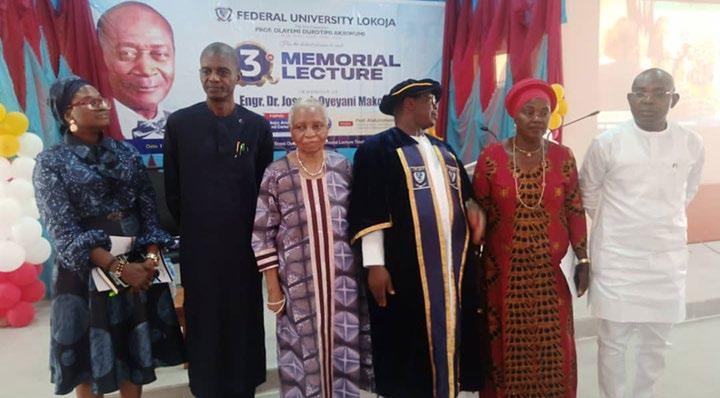
The Sixth Prosecution Witness, PW6, Suleiman Oluwadare Ishola in the ongoing trial of the former governor of Kwara State, Abdulfatah Ahmed, and his former Commissioner for Finance, Ademola Banu, has corroborated the testimonies of earlier witnesses that the Ahmed’s administration borrowed the funds of Kwara State’s Universal Basic Education Commission, UBEC to offset backlog salaries of workers and pensioners in the state.
Ahmed and Banu are facing prosecution by the Economic and Financial Crimes Commission, EFCC on amended 14-count charge, bordering on stealing and mismanagement of UBEC funds in the state to the tune of N5.78billion.
Testifying on Friday, Ishola, who served as the Accountant-General of Kwara State between 20132019, told Justice Mahmud Abdulgafar of the Kwara State High Court, Ilorin that, the sum of N1billion being a matching grant from UBEC was borrowed by the Abdulfatah administration in 2015 to pay salaries of civil servants and pensioners.
received a copy of the letter conveying the governor’s approval of the loan request.
“At a point, I copied the letter that the sum of N1 Billion has been borrowed from the Kwara State Universal Basic Education Board, SUBEB. The essence of the loan was to pay salaries of civil servants and pensioners. I received the letter containing the approval by His Excellency, the executive governor of Kwara State, Alhaji Abdulfatah Ahmed from the Honourable Commissioner for Finance, Alhaji Ademola Banu,” he said.
The witness further confirmed that the N1billion was credited to the state’s salary account in Polaris Bank Plc. However, he said that the amount was
insufficient to cover the entire wage bill, prompting the use of an additional N740 million from existing funds to meet the salary obligations.
Testifying further, the witness stated that in 2016, he received a directive from the second defendant to liquidate the loan, and that the fund was subsequently repaid, as reflected in the state’s account records.
The witness also disclosed how that he was invited by the EFCC, where he was presented with vouchers that indicated that another loan of N850million was allegedly taken by the state government.
The matter was adjourned till June 10 and 11, 2025 for continuation of trial.
Christian Chukwu, a former Super Eagles player, reportedly passed away early on Saturday, April 12, 2025, between 9 am and 10 am

The testimony aligned with that of the former Chairman of the Kwara SUBEB, Barrister Lanre Daibu, who had on Thursday, April 10, 2025 disclosed that he received a formal request from the state government to borrow N1billion from the 2013 UBEC Matching Grant to settle outstanding salaries and pensions in the state.
Daibu stated that he initially hesitated to approve the request, knowing that UBEC funds were strictly for projects outlined in its Action Plan and not to be diverted for any other use. He, however, disclosed that the request was eventually granted, but never repaid throughout his tenure
While being led in evidence by prosecution counsel, Rotimi Jacobs, SAN, the witness stated that he

Emmanuel Okala, who also played for the Nigerian national team, confirmed the news to Segun Odegbami, another exSuper Eagles player.
At the time of filing this report, details surrounding his demise were yet to be revealed, and there has been no statement from family members or associates.
Odegbami, who won the 1980 Africa Nation Cup with Chukwu, said: “I just received the news that between 9:00 and 10:00 this morning, ‘Chairman’ Christian Chukwu, MFR, my bosom friend and teammate, one of the greatest football players in Nigeria’s history, has passed on.
“Babuje, Emmanuel Okala, MON, gave me the sad news a few minutes ago. May ‘Onyim’ find peace with Our Creator in Heaven and console his family.”
In 2021, false reports of Chukwu’s death circulated widely, prompting the legendary coach to refute the rumours during his 70th birthday celebration on January 4, 2021.
Reacting then, Chukwu said: “I am terribly embarrassed by this news that I am dead. Several people have been calling me from across the world since the news broke. I am still investigating the source of the story.”
Chukwu, affectionately known as “Chairman,” was a prominent figure in Nigerian football — both as a player and as a coach. His legacy in the sport remains significant. Chukwu refuted rumours of his death while celebrating his 70th birthday on January 4, 2021.
“I am terribly embarrassed by this news that I am dead. Several people have been calling me from across the world since the news broke. I am still investigating the source of the story.
Chukwu first coached the Kenyan national team in 1998 before he was appointed Head Coach of Nigeria’s Super Eagles in 2003 where he led the team to the semi-final of the 2004 African Cup of Nations, AFCON.
As a player, he was captain of the Nigerian national team, then known as the Green Eagles that first lifted the AFCON trophy in 1980.
Barrister Mohammed Goronyo is the Minister of State for Works. In this interview with TUNDE OMOLEHIN Sokoto, he commended President Bola Ahmed Tinubu for taking proactive measures in both security and infrastructure development. The minister also spoke on Tinubu’s leadership, the positive changes his administration has brought to Nigeria and what his ministry is doing to ensure a good road network across the country. Excerpts:
Can you tell us about how President Tinubu’s leadership has helped the people of Sokoto State which you represented in his cabinet?
There has been a drastic reduction in insecurity in Sokoto State, and I attribute much of this progress to the support of Mr. President. His administration has taken a proactive approach to security by engaging various security agencies, including the Police, DSS, and the military, in tackling the menace of insecurity. We have seen significant progress in restoring peace to the region, which has allowed people to return to their farms and businesses without fear. The President has shown unwavering commitment to addressing security challenges and this has improved the lives of many Nigerians.
Could you elaborate on why you believe Nigerians should be proud to have Bola Ahmed Tinubu as the President?
President Bola Ahmed Tinubu is a patriotic and passionate leader who is deeply committed to the well-being of the Nigerian people. Mr. President’s administration has been marked by significant achievements in various sectors, from infrastructure development to security, and most importantly, the restoration of hope to Nigerians. Under his leadership, we’ve seen a drastic reduction in insecurity, a robust economic agenda, and monumental infrastructure projects that will benefit Nigerians for generations to come. His renewed Hope agenda is transforming Nigeria in ways that were unimaginable before his administration. We are seeing improved roads, a better security apparatus, and, most importantly, policies that directly address the needs of the people.
You spoke about many infrastructure projects under the current administration. Can you share some examples and their impact on the nation?
Certainly! President Tinubu’s administration has embarked on transformative infrastructure projects that are reshaping the nation. Take for example, the four coastal highways that are currently under construction, including the Illela-Sokoto-Lagos-Badagry route, which spans over 1,000 kilometers. There is also the Calabar coastal highway and the Trans-Sahara route linking Akwanga- Jos-Bauchi, and Gombe. These projects are already creating jobs, boosting economic activity, and enhancing connectivity between regions. Additionally, we are witnessing the reconstruction of major expressways like the Kaduna-Abuja-Kano expressway, which will be built with rigid concrete for durability, and the Sokoto-Gusau-Zaria Road, which is also being reconstructed with concrete for long-lasting impact.
You mentioned the importance of education. Can you talk about the initiatives President
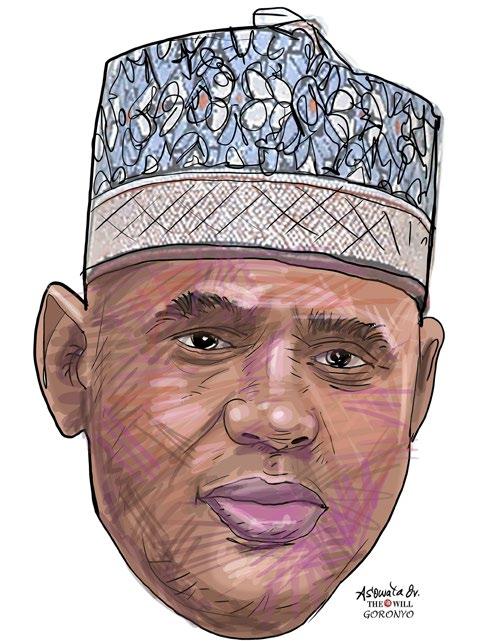
Tinubu has introduced to support Nigerian students?
President Tinubu’s administration has introduced several initiatives to support students, one of the most notable being the student loan programme. This initiative allows students, especially those from disadvantaged backgrounds, to access loans to fund their education.
This is a game-changer for many Nigerian families, as it opens up educational opportunities for children who might otherwise not have had the means to attend school. The President’s vision is to ensure that these students graduate, secure employment, and pay back the loan, which will then be used to support future generations of students. It’s a sustainable way of investing in Nigeria’s human capital.
What other areas of development has the President focused on, especially in terms of economic growth?
The President has made substantial strides in promoting economic growth and inclusivity. We’ve seen improvements in agriculture, with farmers benefiting from increased security and better access to their farmlands. In the past, farmers faced significant challenges due to insecurity in rural areas, but under President Tinubu’s leadership, the situation has improved.
This has allowed for a dramatic increase in agricultural

production, benefiting both the farmers and the larger Nigerian economy. The President has also focused on improving infrastructure, creating policies that support small and medium-sized businesses, and ensuring access to capital for Nigerians to drive economic activity.
You’ve been very vocal in your support for the President’s efforts. What do you think the future holds for Nigeria under his leadership?
The future of Nigeria looks very bright under President Tinubu’s leadership. He has set in motion numerous projects and policies that are already yielding positive results. His commitment to improving the nation’s infrastructure, security, education, and economic growth will undoubtedly create a better environment for Nigerians, both now and in the future. By the time his first term concludes and he seeks a second term, Nigeria will be a transformed nation, with stronger institutions, a growing economy, and a more secure society. Nigerians will be able to look back and see the tangible benefits of his leadership, and I’m confident they will be eager to support his re-election in 2027.
Some of the economic policies or decisions Mr. President has taken are impacting negatively on the lives of common man. Did you see this as sacrifices that may be necessary for a better future?
Yes, sometimes the decisions that the President makes may seem harsh or challenging in the short term, but they are necessary for the long-term betterment of the nation. The President has had to make tough choices, whether in terms of infrastructure investments or policy reforms. These decisions may cause temporary discomfort, but the goal is to build a solid foundation for future generations. The future of Nigeria, for our children and those yet unborn, depends on the sacrifices we make today. And under President Tinubu’s leadership, I firmly believe those sacrifices will be well worth it.
There has been a drastic reduction in insecurity in Sokoto State, and I attribute much of this progress to the support of Mr. President “























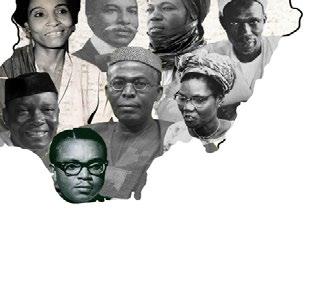















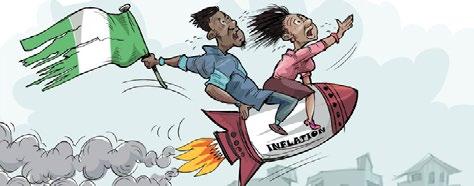


Center Spread Half Page N1, 300, 000
Double Spread N1, 550, 000

Double Spread Half Page N1, 200, 000
10X6 N700, 000
10X5 N650, 000
10X4 N600, 000
10X3 N500, 000
9X6 N440, 000
9X5 N395, 000
9X4 N335, 000
9X3 N310, 000

8X6 N410, 000

8X5 N380, 000
7X5 N320, 000
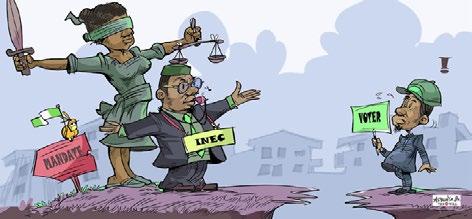



7X4 N315, 000
6X5 N280, 000

6X3 N145, 000
6X2 N85, 000
5X2 N70, 000
4X4 N160, 000
4X3 N95, 000
4X2 N65, 000
3X3 N60, 000
3X2 N50, 000
2X2 N30, 000
2X1 N15, 000
1X1 N7, 000
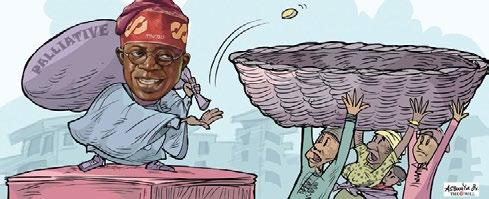
























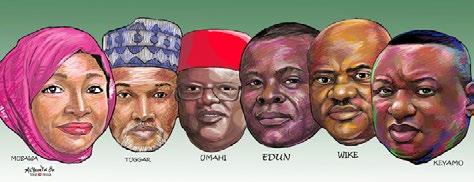

TAlthough it is within the purview of the Customs to demand such clearance papers as claimed by motorists, the question is where should this enforcement be done and how often?
ravellers on the Benin-Ore Expressway have reportedly recounted unpleasant encounters with operatives of the Nigeria Customs Service, NCS, who often demand the clearance documents for their cars.
According to the travellers, the Customs officers stop the cars at designated check points on the road and ask to see their clearance papers.
Failing to produce the documents, the owner of the car would be ordered to proceed to a certain ‘house’ somewhere on the road where the matter would then be settled.
The exercise is so bad that affected car owners have started making and posting videos online to notify the ComptrollerGeneral of the NCS to call his officers to order.
They argue, quite rightly, that the papers are the same that had been used to clear the cars at the ports and so they are being unnecessarily subjected to the same screening all over again.
Frequent travellers on the 200-kilometre road, which stretches from Lagos to Benin City in Edo State, can testify to the presence of NCS personnel on that part of the road, particularly before Ofosu. Many of the operatives are armed.
Recently, an Appeal Court ruling banned these men from the country’s motorways and the Ore/Benin axis of the Lagos-Benin motorway is one of such routes affected by the court ruling. In other words, what the men of the Customs are doing on that motorway is illegal and amounts to sheer extortion, which is punishable by imprisonment for up to 14 years under the country’s laws.
For the avoidance of doubt, Justice Ntong Ntong in the said judgment of the Court of Appeal, Kaduna, delivered on 19, December 2024, barred the Nigeria Customs Service from patrolling highways across the country.
According to the judgement, the Court of Appeal in Kaduna declared that the Nigerian Customs Service lacked the authority to patrol highways and seize goods from citizens.
Interestingly, that ruling was made in response to an appeal filed by the NCS against a Federal High Court judgment that acquitted a businessman, Suleiman Mohammed, of charges related to the importation of foreign goods which were seized from the businessman around June 2019.
In pursuit of the ruling, the court ordered the immediate release of 613 bags of foreign rice, 80 bags of millet worth approximately N200 million and a truck impounded from Mohammed in 2019. Justice Ntong ruled that Mohammed, who purchased the goods from the Central Market in Gusau, Zamfara State, was merely a buyer and not an importer.
Justice Ntong said, “The Nigeria Customs Service has no right to patrol highways or expressways to arrest individuals and confiscate goods under the guise of importation bans.”
The court noted that Customs’ enforcement powers are limited to Nigeria’s borders, where contraband goods typically enter the country.
This is a ruling the NCS brought upon itself by appealing a High Court ruling by a businessman. So why is it difficult for the NCS to comply? Or doesn’t it see that the actions of its men are disrespectful of due process and a recourse to self-help until the case is appealed, perhaps at the Supreme Court?

However, the undebatable aspect of this whole matter is the presence of Customs officers on the country’s motorways
Although it is within the purview of the Customs to demand such clearance papers as claimed by motorists, the question is where should this enforcement be done and how often?
However, the undebatable aspect of this whole matter is the presence of Customs officers on the country’s motorways.
The Court of Appeal ruled that the Nigeria Customs Service (NCS) lacks the authority to patrol highways or seize goods from market buyers under the guise of enforcing importation bans.
According to Justice Ntong Ntong, speaking for a three-member panel, the Kaduna-Zaria Expressway is not a land border and therefore does not fall within Customs’ jurisdiction for enforcing trade restrictions.
As an agency of government, it behoves on the NCS to uphold the rule of law and respect the rights and dignity of Nigeria citizens. We understand that the NCS is under obligation to meet certain monetary targets for the revenue drive of the government. But must that not be at the expense of the violation of the rights of the citizenry and disobedience to the rule of law? We do not think so and urge the NCS authorities to remove its men from the motorways and confine them within its jurisdiction as prescribed by the law.
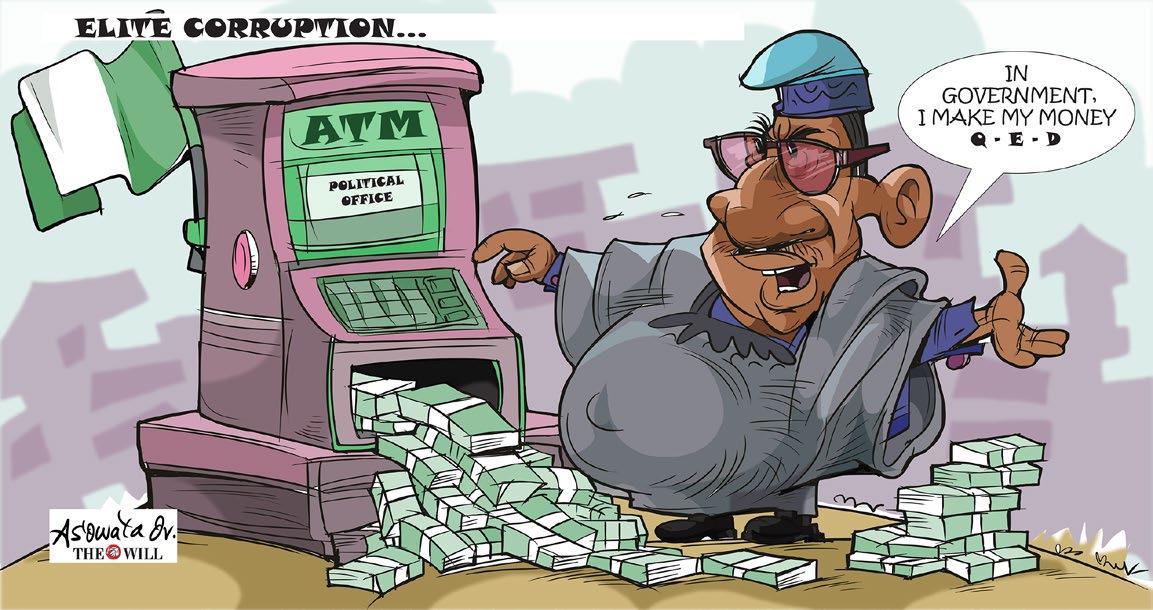




BY ABIODUN KOMOLAFE
On October 1, 1999, I wrote an article titled “The Ethical Imperative of Governance” in one of Nigeria’s leading national newspapers. In the said article, I advocated for a deep sense of objective right and wrong in society, one that transcended Nigeria’s multicultural identity, as this shared moral foundation was essential for achieving our national objectives. Fast-forward to 2025, nearly three decades later, and the question remains: Has anything changed? If so, what exactly has changed, and how do we measure the extent of this transformation?
In fairness to posterity, to ask how we got to wherever we are is to ask whether or not Nigeria should have been created in the first place. The amalgamation of the protectorates and territories, after all, was not put to a referendum, and there is no record of the people giving their consent to this amalgamation. It was largely driven by the British government’s cost-cutting measures, undertaken amidst the turmoil of a Europe on the brink of World War I.
The 1911 report of the Committee headed by Lord Haldane, akin to Nigeria’s Oronsaye Report, paved the way for cost rationalisation, ultimately leading to the amalgamation. However, a critical question remains: Did this amalgamation truly create a country or merely a geographical expression? This conundrum is reminiscent of Giuseppe Garibaldi’s unification of 27 principalities, states and provinces into Italy. As Garibaldi excellently remarked, “We have created a geographical expression; now we must create the Italians.”
General Yakubu ‘Jack’ Gowon is arguably the only Nigerian leader who has come close to addressing the question of national unity. One of his notable achievements was the creation of the National Youth Service Corps (NYSC) in 1974. While the NYSC has unified the Nigerian elite to some extent, its impact has been limited, more so as it has largely been serving interests that are not particularly productive. More importantly, it has failed to unite the Nigerian people. This failure is symptomatic of a broader issue - a country built on rent-seeking and a scramble for resources, which inevitably leads to the current state of disarray. When Nigeria was governed by production-based constitutions, such as the 1963 Constitution, the country experienced flashpoints but also enjoyed a better focus on development and greater national cohesion. A similar trajectory can be observed in India, which has maintained stability despite experiencing flashpoints since its independence in 1947. India has avoided coups and has become the world’s 5th largest economy. Projections also suggest that India will become the world’s largest economy by 2050. India’s experience offers a valuable lesson. By adhering to a constitutional framework similar to Nigeria’s 1960 and 1963 Constitutions, the country has successfully lifted hundreds of millions of people out of poverty. Meanwhile, Nigeria grapples with communal clashes, violence and land-grabbing. Nigerians

are roasting Nigerians, thus rendering the country neither peaceful nor cohesive. This lack of cohesion underscores that sustainable development cannot be achieved through isolated ‘projects.’ Instead, it will remain a case of ‘all motion without development.’
The National Assembly’s inability to promptly reform the internal security mechanism, adopting a community and state policing approach akin to countries like Australia, Canada, Brazil, and the USA, is striking. This inaction betrays a lack of interest in fostering national cohesion. Unfortunately, there is little indication that this will
Apart from when the Super Eagles are playing, there is very little evidence of national cohesion. Dear Fatherland continues to look like a ‘geographical expression’ rather than a state based on national identity, cohesion and a focused programme for national
In response to Nigeria’s struggles with national identity and underperformance, the establishment should revisit and upgrade the 1963 Republican Constitution, backing it with a referendum as a measure of self-preservation. At this critical juncture, the country must work towards a Nigerian equivalent of Italy’s 1971 ‘Historic Compromise.’
The Italian ‘Compromesso Storico’ breathed new life into Italy’s struggling state, addressing its disoriented public finances and stabilising its sagging currency.
APART FROM WHEN THE SUPER EAGLES ARE PLAYING, THERE IS VERY LITTLE EVIDENCE OF NATIONAL COHESION. DEAR FATHERLAND CONTINUES TO LOOK LIKE A ‘GEOGRAPHICAL EXPRESSION’ RATHER THAN A STATE BASED ON NATIONAL IDENTITY, COHESION AND A FOCUSED PROGRAMME FOR NATIONAL RECONSTRUCTION
This historic compromise reduced regional tensions and laid the groundwork for a unified effort against the Sicilian Mafia, ultimately paving the way for its downfall. The conventional wisdom suggests that Lombardy, Italy’s most prosperous region, which, like our Niger Delta, is the goose that lays the golden eggs, would certainly have pulled out of Italy. This prompts a crucial question for Nigeria’s political establishment: Can intellectual honesty and moral circumspection guide a comprehensive overhaul of the country’s perennial underdevelopment and lack of national cohesion?
Nigeria transitioned from military rule to democracy, but the journey was far from glorious. With this reality in mind, we must recognise that India’s independence in 1947 marked the beginning of a period where the country’s military structure prevented at least a dozen potential military coups. This contrasts with Nigeria’s experience under military rule, as well as Brazil’s, which was marked by brutality and viciousness. However, it’s essential to consider the outcomes of military rule, as seen in South Korea’s remarkable transformation since 1958. The question remains: Can military rule be beneficial if it leads to a forced advance, as in South Korea’s case?
online at www. thewillnews.com
BY FREDRICK NWABUFO
Inclusion is an inexorable ingredient for national cohesion. It is an ideal that demands deliberate and methodical enactment. It is largely potent, not as an abstract concept, but as the praxis for promoting peace and harmony and holding it all together at the umbilicus.
The Tinubu administration has been conscientious and pragmatic about building an egalitarian Nigeria; a nation where ethinc or religious complexion does not supplant excellence and performance; a nation where no Nigerian will need to know anyone to enjoy the harvests of good governance; a nation where all are equal before the law; God and man; a nation where that orphan, Chinedu, in the quiet town of Obosi, can enjoy higher education without the constraints of finance; a nation where all citizens regardless of their tongue, tribe, or religion matter in the minutest scheme of things.
It is reductive to abridge or pigeonhole the conversation on inclusion. It is broader as an ideal. It is all-encompassing; affecting all facets of society. In terms of appointments, the lineup is balanced and well-spread, especially matching diversity with competence and character. More importantly, as regards the policies, programmes, and projects of the administration, all Nigerians enjoy equal patrimony. For instance, the Consumer Credit Scheme has beneficiaries drawn from different working strata and diverse taxonomy.
The free C-Sections for women in need and the President’s approval of an 80 percent subsidy on kidney dialysis, reducing the cost from N50,000 to N12,000 per session, are tangible initiatives that directly impact the lives of Nigerians of all phyla.
These programmes and initiatives are implemented across the geo-political zones with absolute fidelity to the sworn oath of fostering unity, peace, and progress.
It is important to mention that under the N50 billion Presidential Conditional Grant Scheme for one million nano-businesses spread across 774 local government areas, with a minimum of 1,000 beneficiaries, over N41 billion has been disbursed to over 828,564 beneficiaries across all the local government areas.
THE PRESIDENT RECENTLY SIGNED SOME REGIONAL DEVELOPMENT COMMISSION BILLS, GIVING EVERY ZONE THE MUSCLE TO ACCELERATE ITS DEVELOPMENT. THIS SHOWS EVEN-HANDEDNESS AND LARGE-HEARTEDNESS
The Nigerian Education Loan Fund (NELFUND) has over 200,000 beneficiaries drawn from across universities in all the geo-political zones, with over N32 billion disbursed as of February 2025.
Also, under the FGN N75 billion MSME Intervention Fund, N659,376,800 has been disbursed to 714 beneficiaries. This is in an effort to support young Nigerians and, most importantly, the live-wire of the economy, MSMEs.
The President recently signed some regional development commission bills, giving every zone the muscle to accelerate its development. This shows even-handedness and largeheartedness.
In terms of roads and other infrastructural projects, they are equitably distributed, with work going on on roads across all geo-political zones — the Abuja-Kaduna-Kano highway, the Sokoto-Badagry road, Enugu-Port Harcourt dual carriageway 2, the Lagos-Calabar Coastal highway, and many others.
The Tinubu administration is building an inclusive society where everyone has a sense of belonging not just in the psychological sense of it but also in the very essence of life, making sure the benefits of governance percolate to every man and woman —even to the last man.
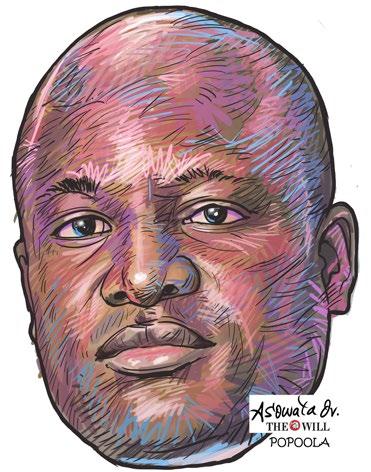
Nigerian Exchange Group Plc (NGX Group) held its 64th Annual General Meeting (AGM) on Wednesday, April 9, 2025, at the Nigerian Exchange Group House.
The event took place as the domestic bourse recorded a strong performance during the first quarter of 2025, suggesting a deeper entrenchment into the global equity market where it had stood out among the world’s best performing stock exchanges.
During the meeting, the Group reaffirmed its unwavering commitment to delivering longterm, sustainable value, emphasizing innovation, operational excellence, and stakeholder engagement as key drivers of growth in an evolving financial landscape.
At the AGM, shareholders approved all resolutions, including a final dividend payout of ₦2.00 per 50 kobo ordinary share, a move that reaffirms NGX Group’s consistent focus on delivering long-term value to its investors. Shareholders expressed strong confidence in the Group’s financial results and dividends, underscoring continued trust in its leadership and growth trajectory.
In his remarks, Group Chairman, Alhaji (Dr.) Umaru Kwairanga, commended the collective resolve of the Board, management, and shareholders in steering the Group towards sustainable growth and innovation.
“As we navigate a dynamic and fast-evolving market environment, your unwavering support empowers us to lead decisively and capture emerging opportunities. We remain anchored on the principles of inclusivity, ambition, and disciplined execution,” he stated.
EDITOR Sam Diala
The prospect of oil-rich Rivers State recovering from the calamitous impact of emergency rule remains uncertain, with its debt hitting N683 billion as of December 31, 2024.
THEWILL reports that industry experts have expressed concern over the impact of the anomalous governance situation in the state, which is capable of worsening the divestment trend in the area, a development that has seen many oil and gas investors leave for other climes.
However, the recent disclosure about the huge debt profile of the state has added another dimension to the worrisome situation.
The Debt Management Office (DMO) in its latest report showed that Rivers, among the league of top indebted states, now bears a debt burden of N683 billion as of December 31, 204.
The figure comprises domestic debt of N364.39 billion and external debt of $199.58 million which translates to N317.70 billion using the CBN exchange rate of N1,591.84/US$1 on Friday, April 11, 2025.
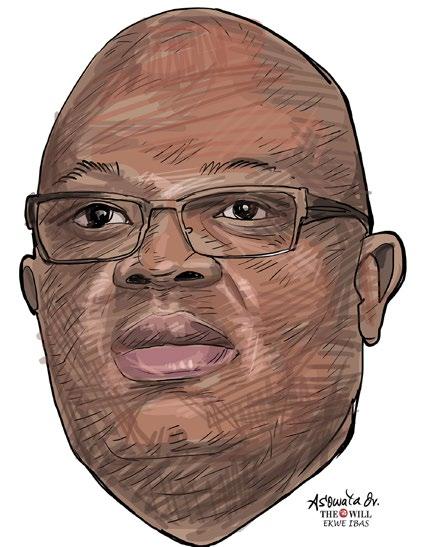
The 2024 debt portfolio is 88.72 percent higher than the 2023 figure of N361.42 billion which constitutes a domestic debt of N232.57 billion and external debt of $80.94 million, equivalent of N128.84 billion using the CBN exchange rate of N1,591.84/US$1 as of April 11, 2025. There are concerns that the emergency rule imposed on Rivers State by the Nigerian President, Bola Ahmed Tinubu, would have serious economic consequences.
Many stakeholders and political watchers also expressed grave concern over the “illegal” declaration of state of emergency in which the constitutionally elected governor and the state lawmakers were removed from office.
They also predict a possible socioeconomic breakdown in a state that habours the major oil and gas deposit which constitute the mainstay of the nation’s economy.
Engr. Kingsley Amadi, an oil and gas company operator, expressed concern over the possible impact of the current political disturbance in Rivers on the state’s economy, especially in the aspect of foreign investment.
ocean is a major advantage to the area. But what has happened in the state will scare investors and further deteriorate the bad economic status of Rivers which many do not see,” Amadi.
THEWILL reports that Rivers has not recorded foreign investment inflow for a long time, unlike its oil and gas producing counterparts like Akwa Ibom, Bayelsa and even Abia. Conversely, the divestment of the major oil and gas companies from the area is impacting severely on the economic advancement of the 58-year-old state.
According to the National Bureau of Statistics (NBS), Rivers recorded less than $2 million foreign investment between 2019 and 2021. The NBS quarterly Capital Importation reports showed that only $0.08 million foreign investment was recorded in 2019 followed by $1.0 million in 2021. The foreign investment climate remained in the amber state until Q4 2023, about seven months after the change of political leadership in the state in which Gov. Fubara succeeded Mr Nyesom Wike who ruled the state for eight uninterrupted years. The highest foreign investment in Rivers since 2019 was the $6.0 million recorded in Q4 2023, as shown in the NBS Capital Importation Report for Q4 2023.
Despite housing huge crude reserves, significant natural gas deposits and being the hub of Nigeria’s oil business, Rivers state attracted zero foreign investment in two quarters (Q1 and Q2) of 2024, according to data by NBS.
Building on this and speaking to the business of the Exchange, Group Managing Director/ Chief Executive Officer, Temi Popoola, shared the Group’s strategic pivot towards building a robust private capital ecosystem to complement the existing public market framework. “We are repositioning to tap into the growing flow of private and venture capital, providing a platform for private companies to raise funds and helping to counteract the trend of de-listings from the Nigerian capital market,” Popoola stated.
Continues on page 35
He noted that many international oil companies (IOCs) are divesting from the Niger Delta territory in recent years, following continued deteriorating business environment and unfavourable government policies.
“Rivers are the cradle of Nigeria’s oil and gas business. Port Harcourt was developed by Shell which helped to create many small and medium enterprises which was a major source of employment. The state is also rich in agriculture and its proximity to the
BESIDES LOSS OF INVESTMENT INFLOW, RIVERS HAS CARRIED INDICES OF POOR ECONOMIC DEVELOPMENT IN RECENT TIMES, SUGGESTING THAT DESPITE ITS ACCLAIMED OIL WEALTH, THE STATE AND ITS INDIGENES DO NOT FARE BETTER THAN MOST OF THE ‘POOR’ STATES IN REAL TERMS
The NBS in its Q2 2024 Capital Importation report showed that, after recording $6 million in 2023, Rivers had no dime to its name by way of investment inflow to the state during the half year period.
Unlike in the past when Rivers was among the few states that featured as capital importation destinations in Nigeria, the report this time revealed a reverse trend.
By this, Rivers joined its neighbouring Imo, the only oil-producing state in the South-east region that attracted no foreign investment for over four years, to showcase zero capital importation during the period. (Imo’s two counterparts – Anambra and Abia states -- recorded a total of $51.48 million and $210.12 million, respectively up till last year, and Imo has the largest gas deposit in West Africa.)
Although Nigeria’s capital




Continues from page 34
importation for Q2 2024 showed a dwindling trend generally, especially regarding oil and gas which recorded $5 million –following agriculture’s $5.9 million – analysts and industry experts noted that the lingering political crisis in Rivers State does not encourage investment inflow.
“Rivers are going to witness a downward trend in capital importation for a long time because its toxic political atmosphere is detrimental to economic growth and development. Capital is sensitive and would not go where its safety cannot be guaranteed,” Jerome Udehi, a finance expert, had told THEWILL
Commenting earlier on the deteriorating political and economic environment in Rivers, an investment analyst, Abimbola Macaulay, noted that the tense situation in Rivers would end in setting the state backward for 20 years because the cracks it has created are deep and wide and the dramatis personae are not ready to give up.
“Rivers are retrogressing while others are moving forward. You can see how wealth could be a curse. When there is too much money in the hands of the leaders, they are carried away and would like to remain in power even to the detriment of the people,” Macaulay said in October 2024.
Besides loss of investment inflow, Rivers has carried indices of poor economic development in recent times, suggesting that despite its acclaimed oil wealth, the state and its indigenes do not fare better than most of the ‘poor’ states in real terms.
Notwithstanding its stupendous wealth, Rivers ranks among the leading poor states of the South-South. A number of quality living indices are also against the 57-year-old oil rich state which sits atop humongous wealth derived from its huge nature’s gift of oil and gas.
In an eye-opening report late 2023, data technology company, StatiSense, unveiled distressing findings from the Multidimensional Poverty Index (2022) report of the NBS concerning some states.
The report shed light on the staggering number of people living
in multidimensional poverty in Nigeria’s oil-rich Niger Delta region, comprising states such as Akwa Ibom, Rivers, Cross River, Edo, Delta, and Bayelsa. The figures are nothing short of alarming and raise serious questions about the effective use of resources and policy implementation in these states. The report revealed that Akwa Ibom, Rivers, and Cross River states were the hardest hit, with 5.08 million, 4.4 million, and 3.44 million people respectively living in multidimensional poverty. Recent data put Rivers’ population at 5.1 million people.
According to him, NGX Group’s approach is not merely about halting delistings, but about ensuring the Exchange evolves alongside global market dynamics.

Nigeria’s in-country fabrication capacity in the oil and gas industry has recorded a boom – surpassing national demand, and enabling local companies to provide fabrication services to other African countries and the Middle East.
This was disclosed by the Nigerian Content Development and Monitoring Board during the flag-off of a 12-month Nigerian Content Non-Compliance (NC-NC) Remediation Training Programme held in Yenagoa, Bayelsa State.
Speaking at the event, the Executive Secretary of the NCDMB, Engr. Felix Omatsola Ogbe, said the achievement was a key milestone under the Board’s 10-Year Strategic Road Map, initiated in 2017.
Ogbe, who was represented by the General Manager of Corporate Communications and Zonal Coordination, Mr Esueme Dan Kikile, said:
“We now have excess capacity in terms of fabrication in-country; we are exporting…outside this country.”

In a twist of fate that altered the boom era of the 80s/90s, when the Nigerian economy witnessed a rapid expansion that impacted positively on the GDP growth, employment, per capita income and general standard of living, the opposite has been the case in recent times, and the Niger Delta is among the worst hit.
The Nigerian economy is now plagued by the wave of divestment and exit of multinational companies across various sectors since the early 2000. This signals a reversal of fortune as businesses struggle to cope with uncertainties of unyielding economic headwinds.
Many international oil companies (IOCs) have sold their assets as they divest from Nigeria’s onshore and shallow water operations.
These include Shell, Exxon Mobil, Chevron, Total Energy and Agip. According to an economist and former Director of Research and Advocacy at the Lagos Chamber of Commerce and Industry in Nigeria,
Dr Vincent Nwani, the exodus of multinationals from the Nigerian economy has cost the country a 94 trillion Naira loss of output in five years. Rivers internally generated revenue (IGR) grew from N12 billion to N27 billion, according to Governor Fubara. The recent declaration of state of emergency in the state will set it backward through many avenues including tax and investments.
The rising debt burden will definitely worsen the economic challenge of the 57-year-old state.
“Rather than focusing solely on halting de-listings, we are working to ensure NGX is not left behind in this shift in preference from public to private capital,” he said.
He emphasized that the Group was exploring innovative ways to capture private capital flows and provide value to companies outside the traditional listing model.
“We are positioning NGX Group not just as a platform for public equity, but as a gateway to all forms of capital. Exchanges globally are evolving in this direction, while some are experiencing de-listings, they’re also attracting significant listings and facilitating private deals that sustain overall market value,” Popoola added.
He further noted that NGX Group is engaging closely with the Securities and Exchange Commission (SEC) to explore institutional reforms that will enhance the market’s attractiveness and accommodate this strategic evolution.
In addition to the strategic
focus, shareholders ratified the re-election of Non-Executive Directors; Nonso Okpala, Fatima Wali-Abdurrahman, and Mosun Belo-Olusoga. They also approved the appointment of members to the Statutory Audit Committee and authorised the Board to determine auditors’ remuneration, thus reinforcing the Group’s commitment to strong and robust governance.
The Group’s subsidiaries, Nigerian Exchange Limited, NGX Regulation Limited, and NGX Real Estate Limited, remain critical to delivering on this bold vision, as NGX Group continues to modernize its infrastructure and expand its strategic partnerships.
The AGM signals a significant shift in positioning: one that embraces global trends, widens investor access, and strengthens the Exchange’s role as a key enabler of Africa’s financial future.
Nigeria’s equity market closed the quarter on Friday, March 28, 2025, rewarding investors’ with N3.49 trillion as market capitalisation and NGX AllShare Index (ASI) hit N66.26 trillion and 105,660.64 points respectively.
This represents an overall yearto-date gain of 2.66 percent, based on 102,926.40 points NGX ASI, and N62.77 trillion
The 10-Year Road Map was developed to increase Nigerian content in the oil and gas sector from 26 per cent in 2017 to 70 per cent by 2027. A major focus of the plan is technical capability development, specifically to enhance the local supply chain without compromising quality and safety standards.
Noting that Ogbe’s declaration underscored the growth of Nigeria’s local content capabilities,
The Executive Secretary recalled that at the inception of the NCDMB in 2010, Nigeria’s fabrication capacity stood at less than 50,000 metric tonnes annually.
He added that the figure climbed to over 228,000 metric tonnes by 2017 and has since grown significantly, resulting in a substantial reduction in the importation of line pipes and other materials.
He stressed that the development has helped retain capital within the country and created employment opportunities. Fabrication yards now provide services such as shipbuilding, steel structure erection, and metal frame fabrication.
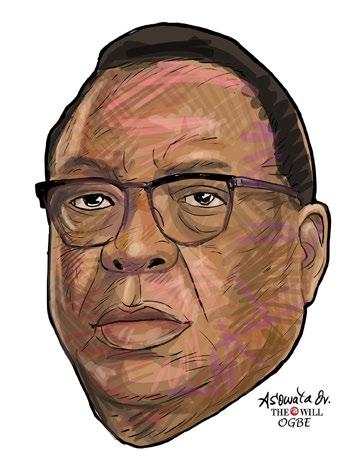
Leading firms in the sector include Nigerdock Nigeria Plc, Dorman Long Engineering, Samsung Heavy Industries Nigeria, Saipem Nigeria, Bablink Resources, Aveon Offshore, and AOS Orwell, among others.
Ogbe said the Board has a broader target of creating 300,000 jobs within the oil and gas industry and linkage sectors like power and construction.

He acknowledged that while we are not at 300,000 yet, “ we have done very well,” adding that several NCDMBtrained Nigerians are now employed in other parts of Africa.
The Remediation Training Programme, sponsored by Waltersmith Petroleum Oil Limited, is being delivered by Dexterous Applied Training Institute. The programme covers both general courses—such as entrepreneurship, ICT, safety at work, and Nigerian Content awareness—and specialised skill sets, including instrumentation and control engineering, quality assurance, and process engineering.
The current batch of the programme comprises 23 out of 52 selected participants. The general courses are being held at the NCDMB Learning Centre in Yenagoa, while hands-on specialised training will take place in Port Harcourt.
Ogbe emphasised that NCDMB, which is in its 15th year in April 2025, is not just a regulator but a business enabler, committed to driving local content growth and economic expansion.

BY TIMI OLUBIYI
Internet users are growing at unprecedent rate and in Nigeria for instance internet users have expressed concerns and frustration over the data price increase in recent time, with many feeling its negative impact on their budgets and mobile smart phone usage.
Nigerian mobile data prices have seen close to 50% increase across major networks like MTN, Airtel, and Glo yet with no known alternative. This shows the significance of data and internet usage, which is a creation of the digital age and current reality of data and content creation, which has witnessed unprecedented scale in Africa.
From mobile phone data and e-commerce activities to social media interactions and government services, vast amounts of information are being created daily which are accessible through internet usage. The economic and technological landscape of Africa has been undergoing significant evolution in recent years. The continent, inhabited by over 1.4 billion individuals, and a larger portion of them create, use and feed on data which is a digital transformation. The convergence of rising mobile phone usage, enhanced internet accessibility, and a youthful, technologically adept demographic has positioned Africa at the forefront of global discussions around technology, innovation and data generation.
In recent years, the phrase “data is the new oil” has gained significant traction in discussions related to technology, business, and the digital economy. But it is public knowledge that when it comes to oil, its availability is limited to certain areas of the world.
However, on the other hand, tech giants like Google, Facebook, Netflix, Amazon, Microsoft, and Apple control most of the world’s data. According to a study by Sandvine in 2021, these companies are responsible for about 57% of global data flow, and they have all commodified data.
The huge amount of data controlled by these mega companies is bigger than most small businesses and corporations. However, this would be another story piece for another time.
In the view of the author, if we want to know if data is really the “new oil,” we need to first look at how it builds value. Data by itself is not useful, just like in the case of oil.
Without any processing or analysis, raw data is just a bunch of information that needs to be figured out. For instance, an online store might keep track of what customers do, like what links they click on, how long they stay on product pages, and what they buy in the past. But until this data is processed, analysed, and turned into ideas that can be used, it is mostly useless.
Business managers in Africa should follow this
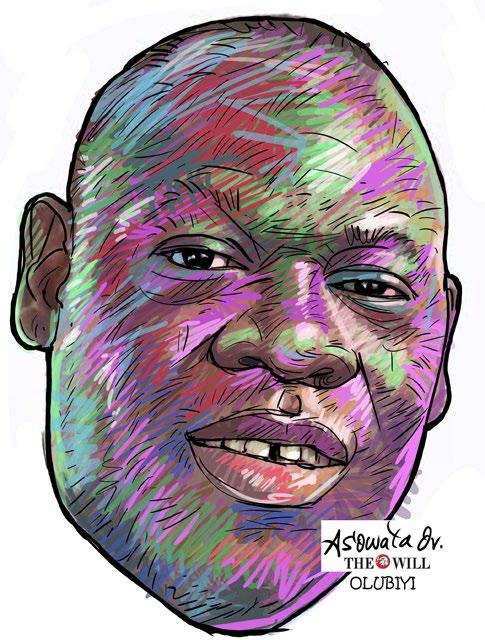
path and should adhere to a mindset of ‘facts superiority over opinion.’ As businesses expand, an increasing number of individuals express ideas regarding the actions to be undertaken. However, it is beneficial to employ a data insight mentality. All company metrics can be tested, measured and improved upon. It is important to note that business owners/managers must have realtime access to the most important data in their business. Understanding which Key Performance Indicators (KPIs) affect revenue and profit is significantly more crucial than the revenue and profit figures themselves.
When data is cleaned up and analysed, it becomes really useful. Just like oil needs to be refined to make petrol, diesel, and other products, data needs to be processed to get helpful results. This is where Google and Facebook shine. They have put a lot of money into technologies like machine learning and big data analytics that can turn huge amounts of raw data into personalised ads, recommendation engines, and models that can predict the future. In this way, they make money for both their users and their owners.
In Africa, the idea of “data as the new oil” is particularly appealing because it could help the continent skip ahead in the normal stages of economic growth. Mobile phones let African countries get around the need for landline infrastructure.
Similarly, data technologies could help African economies get past older, resource-heavy ways of growing, leading to new ideas and long-term growth in fresh ways. In agriculture, for instance, data analytics and satellite imaging can help

In contrast to oil, which is extracted and processed by a limited number of firms, data is more extensively disseminated, including various stakeholders in its collection, analysis, and utilisation
farmers figure out how the weather will behave, get the most out of their crops, and make harvest supply lines work better.
Data-driven solutions in healthcare, like electronic health records (EHRs) and predictive analytics, can help find diseases, control outbreaks, and make healthcare better. In the same way, data-driven education platforms can give students personalised learning experiences and give teachers and managers useful information about how students are doing and what they need.
More so, businesses could be data-driven by setting up special internal research units on data, where insights can be generated to improve on decision-making.
Looking ahead, there are evident similarities between data and oil; much like crude oil, data is valuable. Data is not a naturally occurring resource like oil; it is a by-product of human activity. Oil is a limited resource, whereas data is plentiful and perpetually increasing.
Raw data must be processed and analysed to derive significant insights and facilitate informed decision-making. This is where Artificial Intelligence (AI) is relevant. AI acts as the ultimate data refinery, enabling the conversion of extensive information into meaningful insights.
In contrast to oil, which is extracted and processed by a limited number of firms, data is more extensively disseminated, including various stakeholders in its collection, analysis, and utilisation. Anticipating the future, data will probably witness ongoing advancements in many domains because it is a strategic asset for business and economic growth. With it, people, organizations and government can make better decisions.
• Olubiyi is an Entrepreneurship & Business Management expert.


BY OLUBUSOLA OLOWOSUKO
The financial industry is a tough space where every single business keeps fighting tooth and nail to be at the top. However, metrics have shown that companies can’t achieve scalable and sustainable success without the sales and marketing departments.
The sales department is the lifeblood of every organisation. They are a crucial part of businesses because they are directly responsible for generating revenue for the organisation in which they function. Without their input in attracting potential customers, building brand awareness, and converting leads into paying customers, businesses would struggle not only to gain market share but also to run their daily operations. In other words, no sales or marketing translates to no business.
For this reason, businesses must ensure that their sales and marketing departments make smarter data-driven decisions. From my experiences across several industries, I can 101 percent assure you that the best way to do this is by applying the right financial insights. This brings us to the question: What is financial insight?
There are several definitions of financial insight. Some define financial insight as information extracted from analysing financial data that can be used to inform and develop strategic decisions within a business. In contrast, others refer to it as the analysis and interpretation of data to inform business decisions. With these definitions, we can say that financial insights are vital facts that help businesses make informed decisions.

FOSS, a maritime company, once said this: ‘Data is knowledge, and knowledge is power. With the right information on hand, we can make informed decisions in real time.’ In the world of finance, financial insight is information that helps businesses make decisions in real time.
Financial insight is important because it provides details on key performance indicators (KPIs) such as profit margins, revenue growth, and return on investment (ROI) that help a business be more in sync with the happenings in the finance space. There are several types of financial insights a business can adopt in their day-to-day running, and they include revenue insight, which is the analysis of revenue streams such as sales channels, product lines and customer segments.
Others are cost insight, which is the examination of cost composition, including marketing costs and operational expenses; and cash flow insights, which analyse cash flow patterns and paths such as accounts payable, inventory management and account receivables.
How, then, can financial insights help sales and marketing make smarter, data-driven decisions?
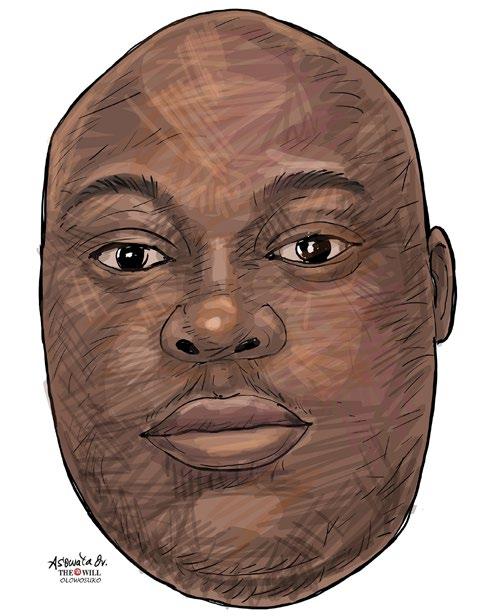
In the financial field, sales and marketing are usually based on personal experiences and industry norms. However, this method can lead them towards making costly mistakes and missing opportunities. Financial insights provide a data-collated framework that enables sales and marketing teams to:
Identify high-value customer areas:
With the help of financial insights, the sales and marketing teams would be able to determine profitable customer sectors and craft out their campaigns to suit the tastes of the customers for more effect.
One exemplary company that applied this strategy to its sales and marketing is the BMW Group with their BMW Individual campaign that was first launched in 1999. What did they do? They used financial insights to identify the fact that high-status individuals mostly purchased customised goods.
So, to target high-value customers, they introduced the BMW Individual, which is a service that appeals to customers who are willing to pay a premium fee to get a customised vehicle that only they can have. Don’t you think that was brilliant?
Optimising pricing strategies:
Using one of the key attributes of financial insight, which is analysing revenue and profit margins, sales and marketing teams can pinpoint the ideal pricing they can attach to their products and services and also determine if there should be an increase or
Financial insight is important because it provides details on key performance indicators (KPIs) such as profit margins, revenue growth, and return on investment (ROI) that help a business be more in sync with the happenings in the finance space
decrease in the pricing of their goods.
The case study I would like us to look at in this light is the popular brand Apple. With financial insight, in 2019, Apple discovered that there was a $5.4 billion decrease in sales from the previous year.
To address this, the CEO of Apple, Tim Cook, announced a new pricing strategy, which included a reduction of prices for certain types of iPhone models. Using that information, they were able to remedy the situation and boost their sales by $14.4 billion by 2020.
Measuring campaign effectiveness:
Sales and marketing teams can utilise financial insights in tracking ROI and other KPIs that would help them evaluate the successes of their various campaigns and make data-driven decisions concerning future investments.
Another example of a brand that financial insight helped is the popular Jumia Nigeria. In 2012, the brand launched a campaign aimed at promoting its mobile app to drive sales and increase sales. To check if the campaign was highly effective, they traced key performance indicators (KPIs) such as the number of downloads, in-app purchases and revenue generated by the ads they pushed out. This, in return, helped them identify the success of the campaign and find areas that needed improvement.
Overall, financial insights are powerful tools, and the case studies provided are proof that they are indeed effective. If you want your sales and marketing team to make smarter, data-driven decisions, then seeking the right financial insight is an applicable strategy you cannot help but adopt.
Photo Editor: Peace Udugba [08033050729]
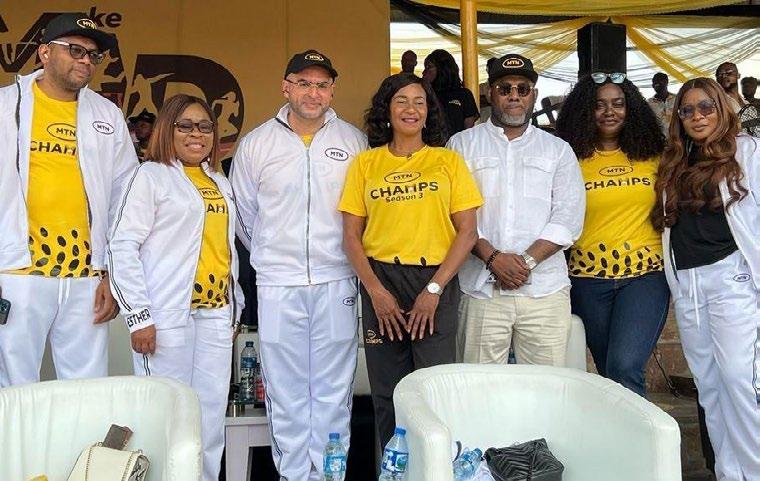
L-R: GM, Internal Audit and Fraud Management, MTN Nigeria, Ibe Eta; Chief Human Resources Officer, MTN Nigeria, Esther Akinnukawe; Chief Operating Officer, MTN Nigeria, Ayham Moussa; Flag Bearer and 5-Time Olympic Athlete, Mary Onyali; DG, Lagos State Sports Commission, Lekan Fatodu; Chief Digital Officer, MTN Nigeria, A’isha Mumuni and Chief Marketing Officer, MTN Nigeria, Onyinye Ikenna-Emeka, at the Flag-off ceremony of MTN Champs Season 3 Continental Relays held at the Yabatech Sports Complex, Lagos on April 9, 2025.
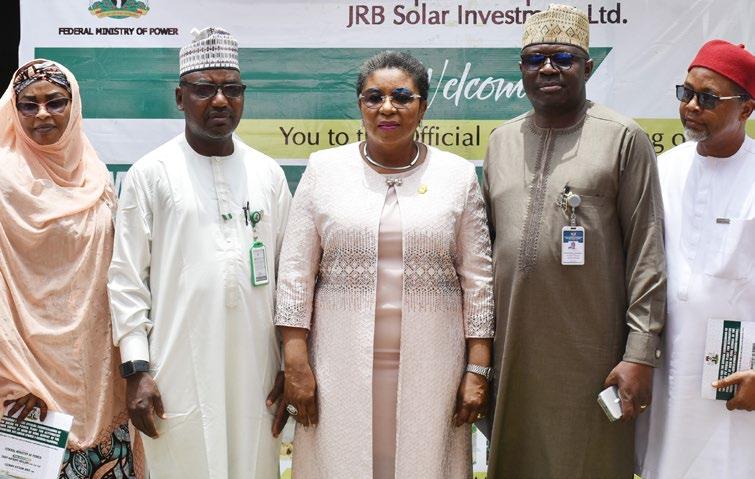
L-R: Permanent Secretary, Career Management Office/ Head of the Civil Service of the Federation, Mrs Fatimah Mahmood; Permanent Secretary, Federal Ministry of Power, Dr. Mahmuda Mamman; Head of the Civil Service of the Federation, Mrs Didi Esther Walson-Jack; Permanent Secretary, Federal Ministry, of Agriculture and Food Security, Mr. Marcus Olaniyi and MD, Teletech Global Investment Service Limited, Ichie Chidi Omeje, during the inauguration of 1mw Solar PV Power Plant for alternative power supply at the Head of the Civil Service of the Federation’s office in Abuja on April 7, 2025.

Representative of the President Minister of Agriculture and Food Security, Sen. Abubakar Kyari (r), presenting an award to the Special Adviser to the President on Public Communications and Media, Mr. Daniel Bwala, during an Award Dinner organised by Borno South Stakeholder’ in Abuja on April 10, 2025
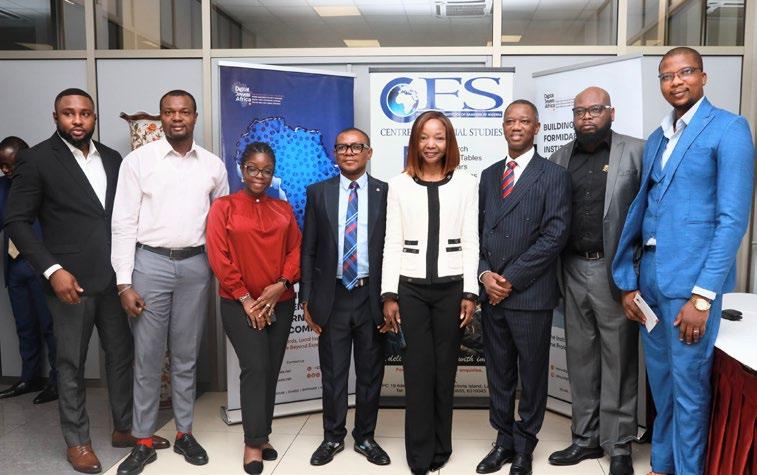
L-R: Head, Academy, Digital Jewels Africa, Mr. Kingsley Omoike; Officer, CIBN Centre for Financial Studies, Mr. Francis Agoh; Senior Associate, CIBN Centre for Financial Studies, Mrs. Abidemi Ephraim Emmanuel; Director, CIBN Centre for Financial Studies, Mr. Mary-Fidelis Abiahu, MCIB; MD/CEO, Digital Jewels Africa, Mrs. Adedoyin Odunfa; Executive Director, Group Chief Technical Officer, Digital Jewels Africa, Mr. Tokunbo Taiwo; COO, Digital Jewels Africa, Mr. Kunle Shadare; Programme Officer, Digital Jewels Africa, Mr. Sylvarnus Eseigbe, during the cyberresilience table-top simulation exercise for board members, organized by CIBN in Lagos on April 9, 2025.

Executive Secretary, Pension Transitional Arrangement Directorate (PTAD) Tolulope Odunaiya (r) presenting a plaque to the Chief Commissioner, Public Complaints Commission, Basir Abubakar, during his visit to the Commission’s office in Abuja on April 10, 2025.

L-R: Non-Executive Director, Nigerian Exchange Group, Mr. Ademola Babarinde; Non-Executive Director, NGX Group, Mr. Mohammed Garuba; Independent Non–Executive Director, NGX Group, Dr. Okechukwu Itanyi; Independent Non-Executive Director, NGX Group, Mrs. Fatima Wali-Abdurrahman; GMD/CEO, NGX Group, Mr. Temi Popoola; Group Chairman, NGX Group, Alhaji (Dr) Umaru Kwairanga; Ag. Company Secretary, NGX Group, Mr. Izuchukwu Akpa; Independent Non–Executive Director, NGX Group, Mrs. Ojinika Olaghere; Non-Executive Director, NGX Group, Mr. Nonso Okpala and Non-Executive Director, NGX Group, Mr. Sehinde Adenagbe during NGX AGM in Lagos on April 9, 2025.





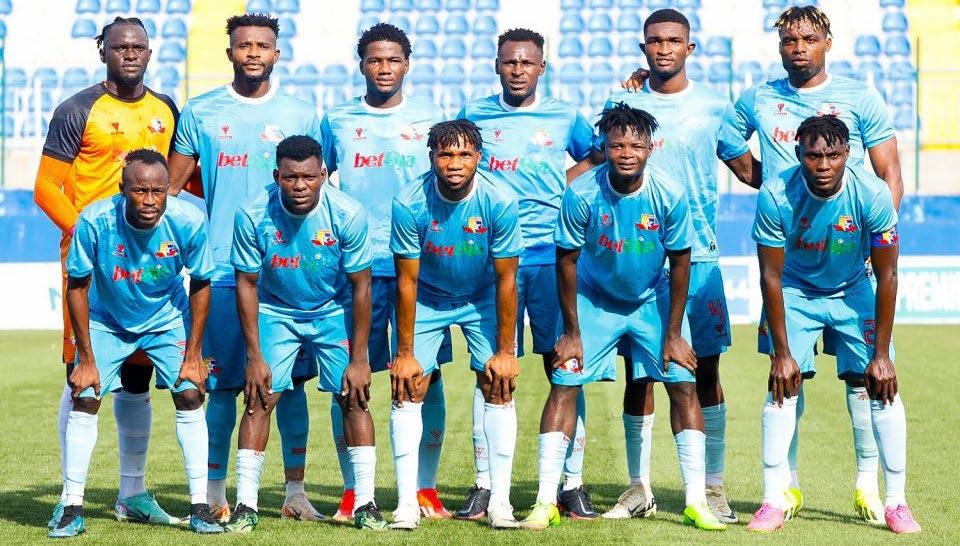
BY JUDE OBAFEMI
The 2024/2025 Nigeria Premier Football League (NPFL) season is racing towards a thrilling crescendo, with the battle for the title emerging as one of the most gripping spectacles in recent years. As the campaign nears its end, Remo Stars lead the pack, holding a six-point advantage over Rivers United, who in turn sit five points ahead of the unexpected contenders, Abia Warriors. This rare three-way tussle has breathed new life into Nigerian football, captivating supporters and sparking debates across the country. With only a handful of matches left, the stakes are sky-high, and the unfolding drama promises to reshape perceptions of the NPFL’s competitiveness and appeal.
Remo Stars have been the standout side throughout this season, their consistency under coach Daniel Ogunmodede setting them apart as frontrunners. Their recent performance against Lobi Stars, where they clawed back from a two-goal deficit to earn a 2-2 draw, exemplifies the tenacity that has defined their campaign. That result stretched their lead at the summit to six points. With 61 points from 32 matches, Remo Stars are on the cusp of claiming their maiden NPFL title, a feat that seemed improbable not long ago. Ol
Ogunmodede’s tactical nous and calm leadership have been instrumental, forging a squad that thrives under pressure.
Beyond crowning a champion, this season is laying the groundwork for a brighter future

Players like Haruna Hadi, with his relentless energy, and John Abah, a linchpin in defence, have been pivotal, delivering standout performances week after week. Even when their play lacks flair, Remo Stars have shown a knack for grinding out results, a trait that has kept them atop the table and made them the team to catch as the season enters its decisive phase.
Meanwhile, Rivers United have quietly gone about their business, their steady form under Finidi George keeping them firmly in the hunt. The former Super Eagles winger and coach has instilled a pragmatic approach that prioritises results over style, and it is paying off. Their 1-0 triumph over Remo Stars on April 6 was a defining moment, with David Sholunmade’s late strike slicing Remo’s lead to five points and reigniting the title chase. That victory showcased Rivers United’s ability to seize critical opportunities, a quality that could prove decisive in the weeks ahead.
With Kabir Abdullahi providing a sharp edge up front and Ndifreke Effiong Udo offering dynamism to the squad, the team has a balanced core capable of challenging the leaders. The return of forwards Samson Obi and Chijioke Mbaoma has further bolstered their attack, adding depth at a crucial juncture. With six matches remaining, Rivers United’s experience and resilience make them a formidable force, and their knack for winning away, as seen in their victory over Elkanemi Warriors, could be the key to overturning Remo’s advantage.


Abia Warriors, by contrast, have been the season’s surprise package, defying expectations to gatecrash the title conversation. Under the shrewd guidance of Imama Amapakabo, they have risen to third place with 50 points from 32 matches, capitalising on the stumbles of others to stake their claim. Their recent 2-1 defeat to Enyimba on April 6 underscore their competitiveness, as they pushed one of the league’s heavyweights to the brink. Players like Sunday Megwo, with 10 goals to his name, and Anthony Ijeoma, a steady presence in the side, have been central to their ascent. Amapakabo’s tactical discipline has transformed Abia Warriors into a team that punches above its weight, blending grit with moments of brilliance.
While they face a steep challenge to close the gap to the top two, their presence in the race adds an unpredictable twist. Their ability to trouble even the strongest sides suggests they could yet play a kingmaker’s role, if not snatch the crown themselves.
The road ahead will be pivotal, with each team’s remaining fixtures likely to shape the title’s destiny. Remo Stars, buoyed by their six-point cushion, appear to hold the upper hand, but their schedule is not without pitfalls. Encounters with teams battling relegation or vying for continental places could test their resolve, and their draw against Lobi Stars hints at vulnerabilities under pressure. Rivers United, meanwhile, face a stern examination, with matches against top-half sides like Abia Warriors and Sunshine Stars looming large. Their ability to take points on the road will be vital in closing the gap to two points. Abia Warriors, as the dark horses, may have the toughest run-in, with the clash against Rivers United offering a chance to upset the applecart. Clearly, Rivers United and Abia Warriors will encounter stiffer opposition in their bid to catch Remo Stars, who enjoy a slightly kinder path. Yet, this only serves to heighten the anticipation, as every match carries the potential to shift the balance dramatically.
This electrifying race extends beyond the pitch, carrying significant implications for the NPFL’s reputation and allure. The league has long grappled with inconsistency and waning interest, but this season’s tight contest signals a turning point. The rise of privately owned clubs like Remo Stars, challenging the old guard and recently promoted side Ikorodu City, speak to a growing parity that is refreshing the competition. Fans are taking notice, with packed stands and lively discussions reflecting a surge in engagement.
Media coverage has ramped up too, shining a spotlight on a league that is often overshadowed by bigger African counterparts. This renewed buzz could draw in sponsors and investment, bolstering the NPFL’s financial footing and infrastructure. A season this competitive reveals the league’s potential to deliver drama and quality, aligning it more closely with global standards. For supporters, it is a chance to revel in a spectacle that is rekindling pride in Nigerian football, while for administrators, it is an opportunity to capitalise on the momentum and elevate the NPFL’s standing.


ogannah@thewillnews.com
Last week, Benedict Peters, a very influential Nigerian businessman across the continent who lives in Ghana, found himself at the centre of a brief controversy in the West African country.
Initial reports suggested he was arrested for obstructing traffic, operating an armed militia and using sirens, allegations that sparked concern, given his prominence. However, the Ghanaian police clarified that no arrest occurred. They described the incident as a routine traffic matter, resolved without charges, stemming from a misunderstanding.
Media coverage, especially in the West African nation, had inflated the event, but the official account revealed it as minor, highlighting how quickly misinformation can spread. This Ghana episode, though fleeting, contrasts sharply with Peters’ substantial contributions to Africa’s economic and social fabric. Far from defining him, it underscores his ability to rise above distractions, as his work in oil, gas, mining, and philanthropy continues to shape the continent’s future.
Peters was born into a middle-class family in Nigeria and graduated from the University of Benin with a degree in geography and regional planning. His career began in the 1990s, working for companies like Ocean and Oil Services Limited, the parent company of Oando Plc, and MRS Oil and Gas Limited in the oil and gas sector. These roles provided the foundation for his entrepreneurial path.
In 1999, he founded Sigmund Communecci, a petroleum trading firm, which he rebranded as Aiteo Group in 2008. Today, Aiteo stands as Africa’s largest indigenous oil producer, managing key infrastructure like the Abonnema Storage Terminal and one of Nigeria’s largest petroleum tank farms.
A defining achievement came in 2014 when Aiteo acquired a majority stake in Oil Mining Lease (OML) 29 and the Nembe Creek Trunk Line from Royal Dutch Shell Plc for $2.4 billion.
OML 29, in the Niger Delta, ranks among Nigeria’s most productive oil blocks, while the pipeline is vital for regional oil transport. This deal marked a triumph for an African company over a global giant, revealing Peters’ strategic foresight and reinforcing Aiteo’s industry standing. It also reflected his belief in African-led economic progress, challenging foreign dominance in a cut-throat sector. Peters has not confined his ambitions to oil. He founded Bravura Holdings to develop mining assets across Africa, targeting minerals like platinum, lithium, copper and gold, Operating
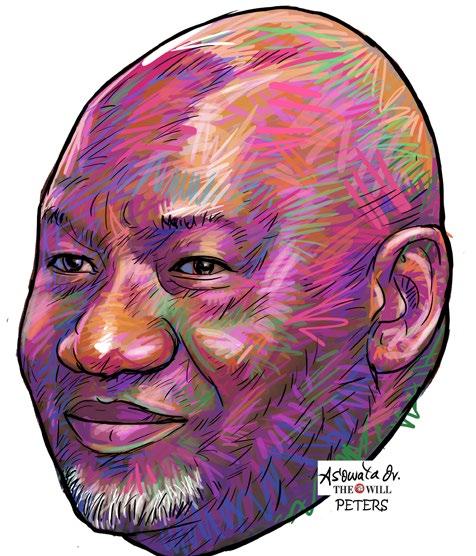
resources critical for modern industries. Operations span Ghana, Nigeria, Zimbabwe, Congo, Senegal, and beyond, creating jobs and fostering economic ties.
Aiteo’s collaboration with the Atlantic Council to study critical minerals further demonstrates his forward-thinking approach, aligning with global demand shifts while embodying a Pan-African vision that promotes cooperation and self-reliance across the continent.
Philanthropy forms a cornerstone of Peters’ enviable legacy. The Joseph Agro Foundation supports rural Nigerian farmers with tools, training and resources, improving livelihoods and agricultural output. Its projects also enhance education and water access, addressing practical community needs.
On the other hand, the B&E Foundation tackles inequalities, funding initiatives for underprivileged groups across Africa. Peters’ support for sports, through sponsorship of the Nigeria Football Federation and Confederation of African Football (CAF) Awards, as well as sporting festivals in Nigeria promotes talent and unites communities. These are all efforts that create thousands of jobs, uplift rural areas and reflect a commitment to societal good beyond profit.
The Ghana incident warrants closer scrutiny in this context. Allegations of a “militia” likely arose from Peters’ use of armed private security, a standard practice in the high-risk
minerals, oil and gas industry, where threats to personal safety are very high. Global CEOs in similar sectors employ comparable measures and the charge appears to reflect a misinterpretation rather than wrongdoing. The use of sirens, also tied to security protocols, in my view was similarly overstated. This is quite common in this part of the world. So, I don’t understand why this is even an issue.
The police’s swift resolution, with no charges, suggests overzealous reporting or personnel, not a substantive issue. Past claims, like a 2019 alleged fraud case in Nigeria, were fought rigorously and dismissed by courts, further supporting Peters’ integrity against politically tinged accusations.
Recognition from respected bodies bolsters this view. In 2018, Forbes named Peters among Africa’s Top 50 Most Powerful People in Oil and Gas. He received the 2014 Marquee Award for Global Business Excellence and the 2015 Dr. Martin Luther King Jr. Legacy Award for Economic Empowerment from The King Centre. Multiple “CEO of the Year” titles in Nigeria affirm his standing among peers. Earned through decades of impact, these are awards that position Peters as a figure for emulation, not phoney sensationalism.
Peters’ career traces a path from modest beginnings to continental influence. Starting with limited resources, he built Aiteo into a powerhouse, competing with international firms. His mining and critical minerals ventures address Africa’s future needs, while his philanthropy invests in its people, be they farmers, youth, or underserved communities.
Operating across 14 African countries, he fosters economic unity, embodying Pan-African ideals in a dog-eat-dog industry where stakes are high and envy common.
The Ghana incident, clarified as trivial, fades against this backdrop. It reflects the scrutiny public figures face, amplified by competitive tensions, not evidence of fault. Peters’ response, which is to continue his work undeterred, mirrors his approach to past challenges, focusing on progress over noise.
This great thinker, Benedict Peters, remains a pivotal force in African business and society. His achievements in oil, gas, mining, and community support highlight a career driven by vision and responsibility. The Ghana matter, a minor hiccup, underscores his ability to thrive despite distractions. His story, rooted in building and giving back, invites admiration for its depth and impact, not fleeting shenanigans.